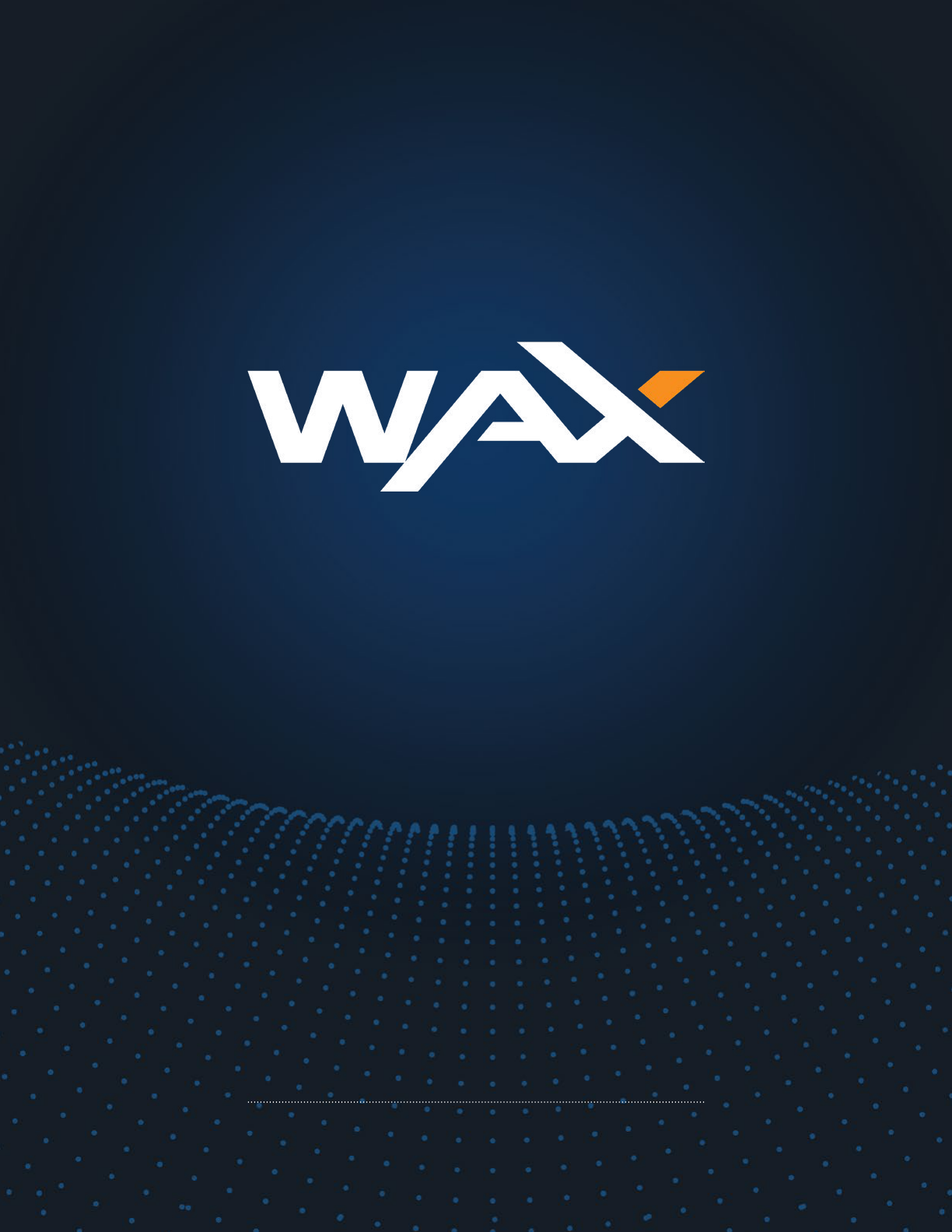
1
Worldwide Asset eXchange (WAX)
Global Decentralized Marketplace for Video Game Virtual Assets
White Paper
Version 1.7
From the founders of OPSkins
opskins.com | waxtoken.com
December 23, 2017
By Jonathan Yantis, COO, WAX | William Quigley, CEO, WAX | Malcolm CasSelle, President, WAX

2
WAX is the onramp for mass market
cryptocurrency adoption.
-William Quigley, OPSkins CEO
From the founders of OPSkins
opskins.com | waxtoken.com
Special thanks go to Jonathan Yantis, the creator of real money trading
for virtual items in 1997 and to John Brechisci, Jr., for creating OPSkins to
enable skins to be freely convertible into at almost anywhere in the world.
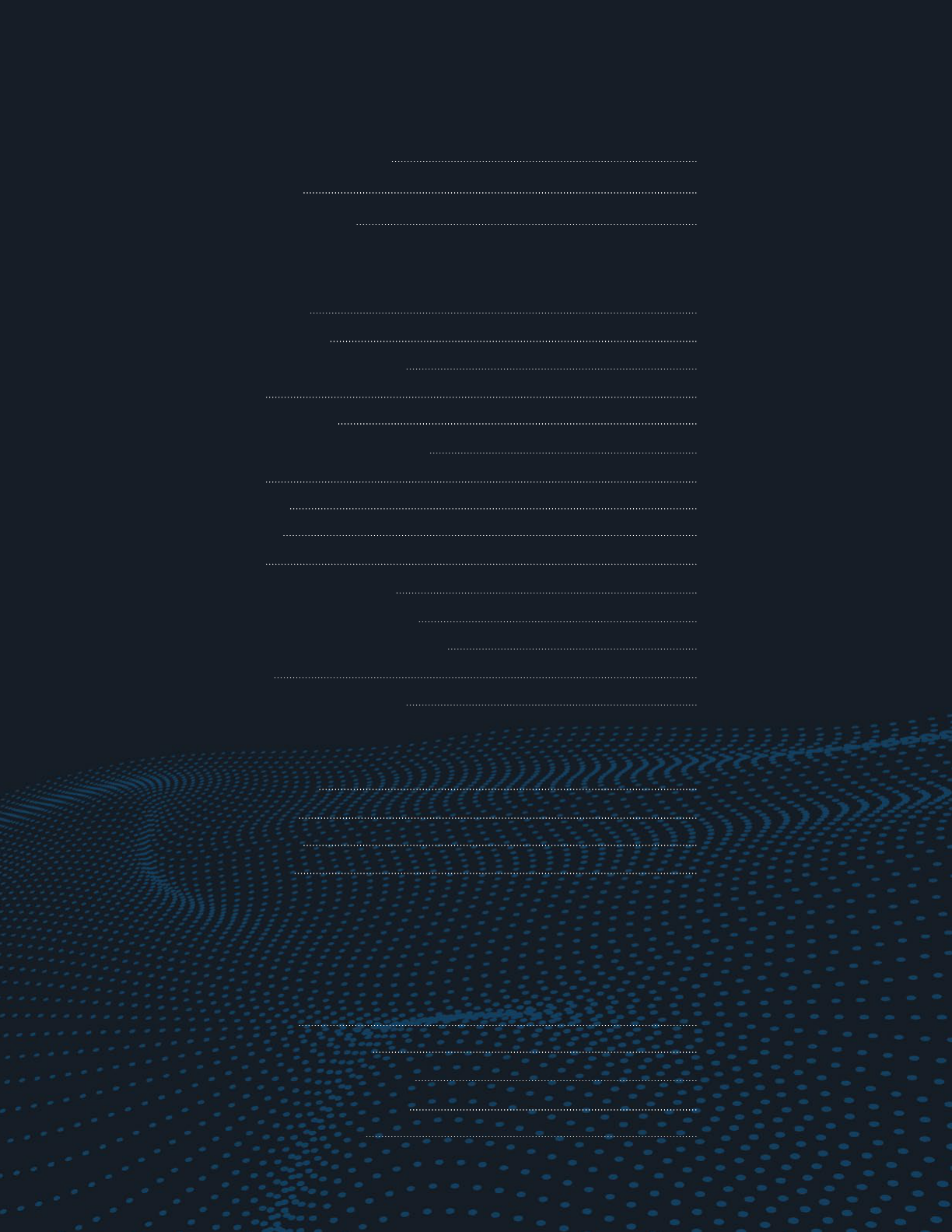
3
Market Problem
Solution: Worldwide Asset eXchange (WAX)
WAX Value Proposition
WAX Team
WAX Functionality
WAX Protocol
WAX Tokens
WAX Accounts
Delegated Proof of Stake
Guilds
Transfer Agents
Transactions and Messages
Voting
Contracts
Proposal
Rating
Listing of Virtual Goods
Purchase of Virtual Goods
Settlement Execution Contract
Dispute
Transfer of Digital Goods
WAX Applications
WAX Connect
WAX Node
WAX Wallet
WAX Core
WAX Roadmap
WAX Token Sale
Token Sale
Market Development
Contributers and Advisors
WAX Team and Founders
Token Sale Process
05
06
07
10
11
12
12
13
14
16
17
19
19
20
20
21
21
22
23
24
24
25
25
25
25
26
26
26
27
27
27
28
28

4
Use of Proceeds
Legal Requirements
Summary & Conclusion
Appendix A: WAX Use Case
Appendix B: Marketplaces Create Wealth
Centralized Virtual Goods Marketplaces
Constraints of Centralized Marketplaces
Benets of Decentralized Marketplaces
Appendix C: Virtual Goods Trading
Virtual Goods Example: Item Skins
Table: Key Friction Factors in Virtual Goods Trading
Disclaimer
29
29
30
31
34
36
36
36
38
39
40
44

5
Each year, 400M+ gamers purchase $50B+ in virtual items
worldwide. The vast majority of gamers who buy and sell
virtual assets today are likely to have their items stolen or pay
exorbitant fees through cross-border transactions unless they go
to a centralized trading platform. This market friction is the key
factor limiting the growth of this $50+ billion market.
The net effect of the lack of marketplace trust is that the
virtual asset trading industry is fragmented across hundreds
of competing marketplaces, each utilizing different business
practices tailored for their region of the world. This creates
signicant territorial supply and demand imbalances.
The ideal solution to this problem is a global virtual asset
repository, accessible to anyone, which provides a complete
catalog of all items available for sale in real time. Such a
repository, when coupled with distributed trust mechanisms, and
a reliable low-cost settlement network, will vastly improve price
discovery and market liquidity, thereby increasing market size.
Market Problem
OPSkins, the world’s largest platform for video game
virtual goods traders is building a blockchain protocol
called Worldwide Asset eXchange (WAX), designed to
enable an unlimited number of marketplaces operated
by individuals or small businesses to buy, sell and
trade virtual goods at scale with just a few clicks.
“
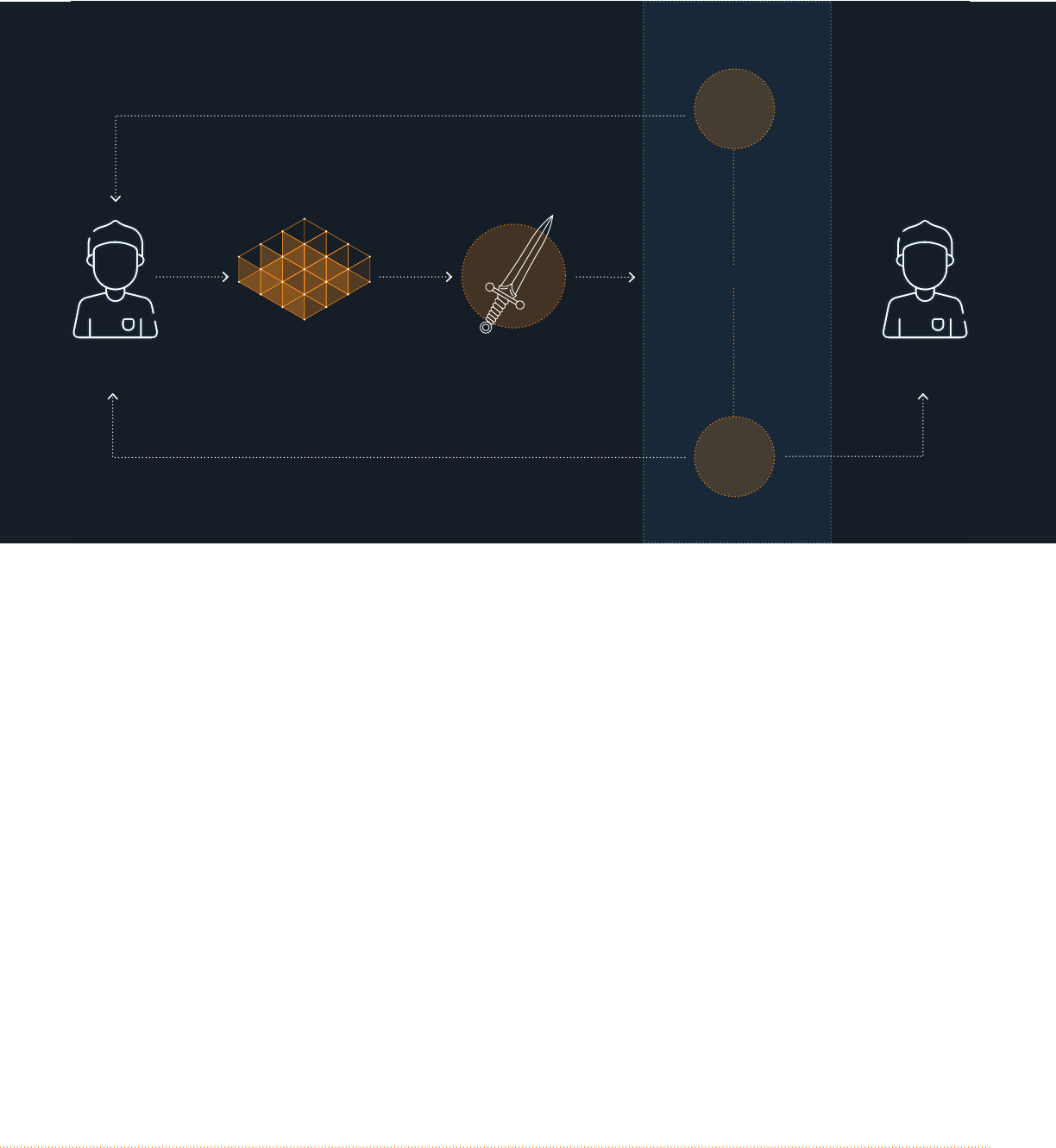
6
Solution: Worldwide Asset
eXchange (WAX)
The role of the WAX Platform as a virtual goods marketplace is to
decentralize exchanges while allowing users to purchase goods with
a global token. With this important shift in structure, millions of buyers
and sellers will have the power to use their social graphs to buy and
sell virtual goods effortlessly. WAX can support a variety of selling
structures to maximize liquidity, such as bidding, reserve bidding or xed
price. The cottage industry of buyers and sellers currently served by
OPSkins will not have to develop complex backend systems but, instead,
will use the WAX Platform to leverage the most powerful aspects of the
OPSkins asset exchange.
WAX will enable a new generation of virtual asset traders, in a similar
way that modern marketplaces enabled entrepreneurs to become power
sellers online, ride share drivers or hosts for travelers (Alibaba, Amazon,
Uber, and Airbnb). These platforms enhanced commerce for millions
of small business owners and created hundreds of billions of dollars of
Seller BuyerWAX Listed Asset
Oer Accepted?
YES
NO
ASSET TRANSFER
PAYMENT
TRANSFER AGENT
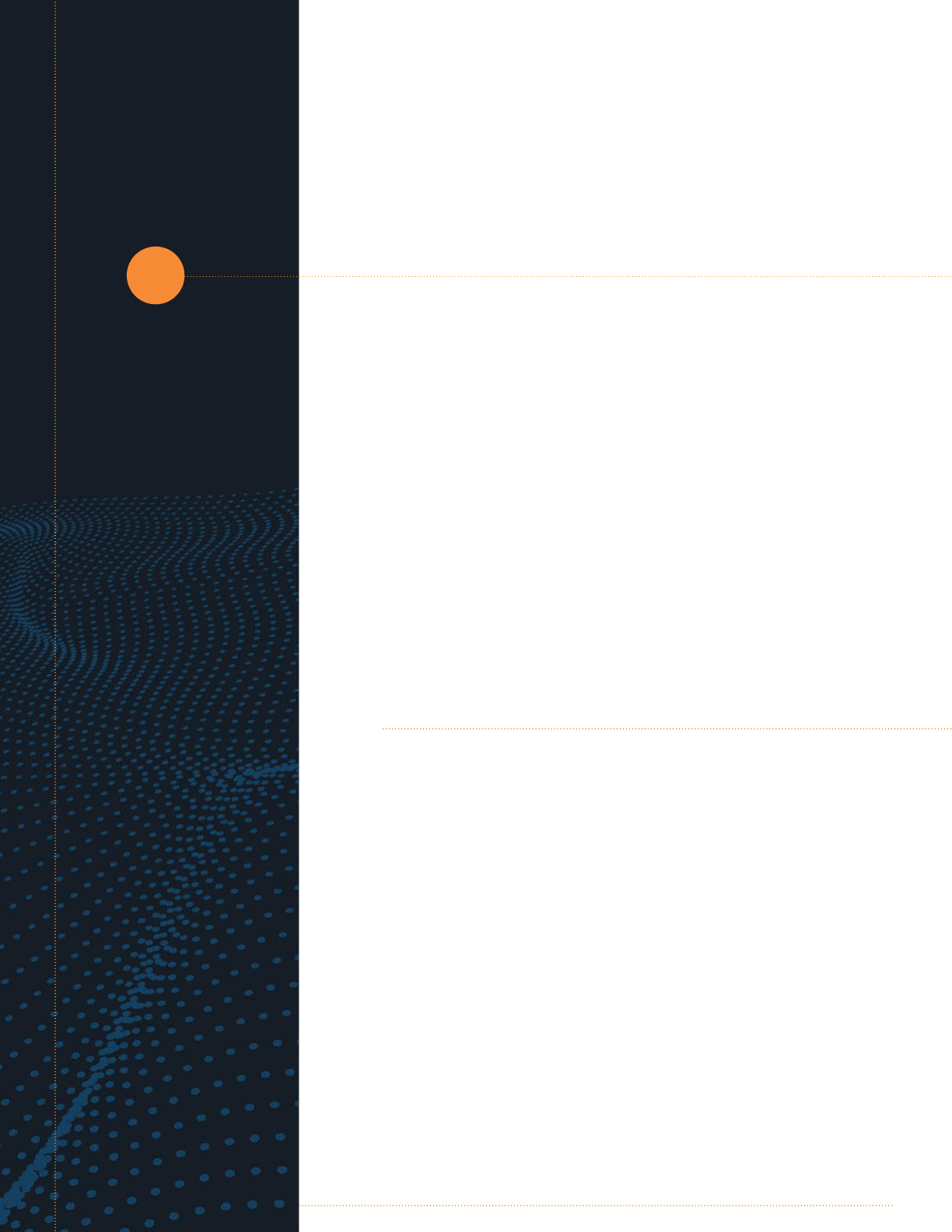
7
new value by making their platforms easy to use and widely
available, while simultaneously solving expensive problems
like fraud prevention, settlement execution, product and seller
reviews, standardized catalogs of product information, supply
and demand matching, etc.
WAX Value Proposition
WAX is a decentralized platform that enables anyone to operate
a fully functioning virtual marketplace with zero investment into
security, infrastructure or settlement. Developed by the founders
of OPSkins, the world’s leading marketplace for online video
game assets, WAX is designed to serve the 400+ million online
players who already collect, buy and sell. With the inclusion
of WAX’s simple exchange widget, gamers will have access
to a worldwide market, with blockchain trust and transaction
verication.
A user decides to purchase a virtual good by selecting
“buy now” in the WAX widget and is presented with
an authentication window. If this is the rst time he
is interacting with the WAX Platform, he’ll be taken
through an onboarding process that creates an
identity, allocates a WAX Wallet, and allows him to
fund the immediate purchase, all without forcing him
to understand WAX, the WAX Platform, or WAX Tokens.
From the buyer’s perspective, all that is required is to
select an item, provide payment, and, a short while
later, the item shows up in his personal inventory
without him ever leaving the site he was visiting.
“
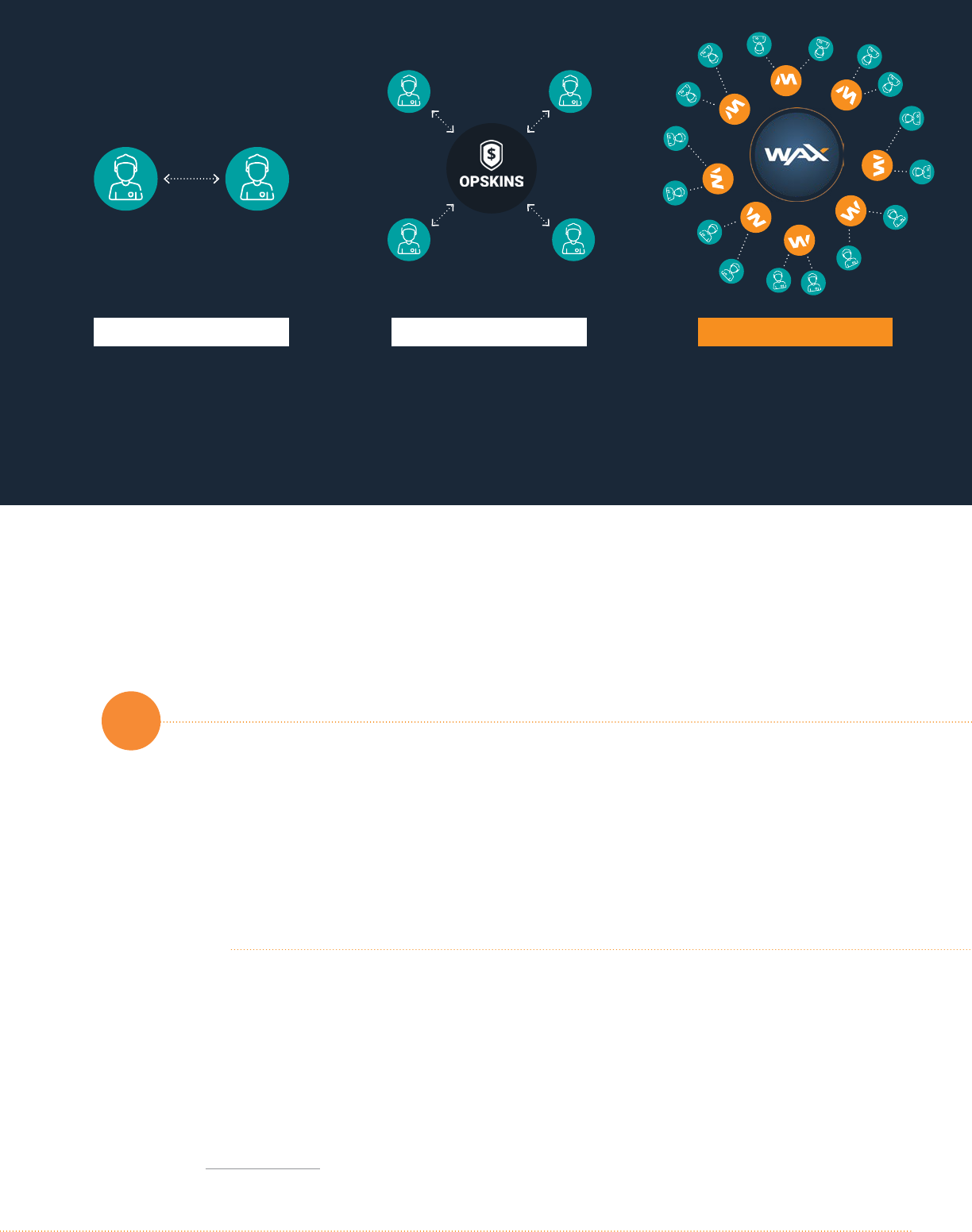
8
The WAX Platform will allow millions of traders to create their own
virtual stores on one decentralized platform. The WAX Platform unites
everyone, providing security, transaction, and settlement services that
will usher millions of new participants into a growing ecosystem.
1 See https://mygaming.co.za/news/features/89913-there-are-1-8-billion-gamers-in-the-
world-and-pc-gaming-dominates-the-market.html
OPSkins introduces the WAX blockchain protocol, connecting
2 billion gamers worldwide
1
to a highly sophisticated virtual
goods exchange. By decentralizing these exchanges, vastly
more trading in the already sizable $50 billion video game
virtual goods trading market is possible.
“
WAX20152004
Decentralized Marketplace
The WAX Platform, a decentralized
marketplace, allows buyers and sellers to deal
directly with each other at low cost.
Centralized MarketplacePeer-to-Peer Transactions
As World of Warcraft grew to 12 million
subscribers, a vibrant peer-to-peer secondary
market develops to sell in-game goods for cash.
For most users, this was risky and dicult.
With massive liquidity, buyers and sellers get the best prices and the
quickest settlement, while the global gamer community as a whole
receives their own secure virtual asset exchanges on the blockchain
with WAX. Similar to how marketplaces such as Amazon, Alibaba, Uber,

9
and Airbnb changed commerce for millions of small business
owners and created hundreds of billions of dollars of new value,
WAX empowers a new generation of virtual asset traders.
400+ million multi-player online gamers are increasingly familiar
with buying and selling virtual online game assets. To provide
a trusted third party assist, transfer agents are required to
facilitate moving items from sellers to buyers. This complicated
process is operated by a combination of Application
Programming Interfaces (API’s) and bots. Virtually all the open
source software used in the industry was written by the OPSkins
team. OPSkins, a pioneer in the online gaming industry, has
developed the method for WAX to empower all key constituents
of the ecosystem to earn more by expanding their ability to buy
and sell online game assets.
For example, a site attracts someone to list their item for sale,
that site owner would get a share of the listing fee. Similarly, if a
site attracts a buyer who ultimately buys an item, that site owner
would get a share of the transaction fee. Many aliates working
with OPSkins today have already leveraged their participation
into small virtual goods businesses. But that process is
complicated, settlement takes more than 30 days, and there are
problems with transaction verication and accounting.
These and many not-yet-developed silos of activity will work
independently and collectively to make the decentralized
exchange work. OPSkins runs as a centralized mechanism,
and by sort of “exploding those out” and atomizing them, we
allow the whole ecosystem to grow, because everyone gets to
play a role where they can provide value. Now rather than one
market player many times larger than its nearest competitors,
thousands of sites can all be just as signicant without having
to invest tens of millions of dollars in software development and
hardware infrastructure.
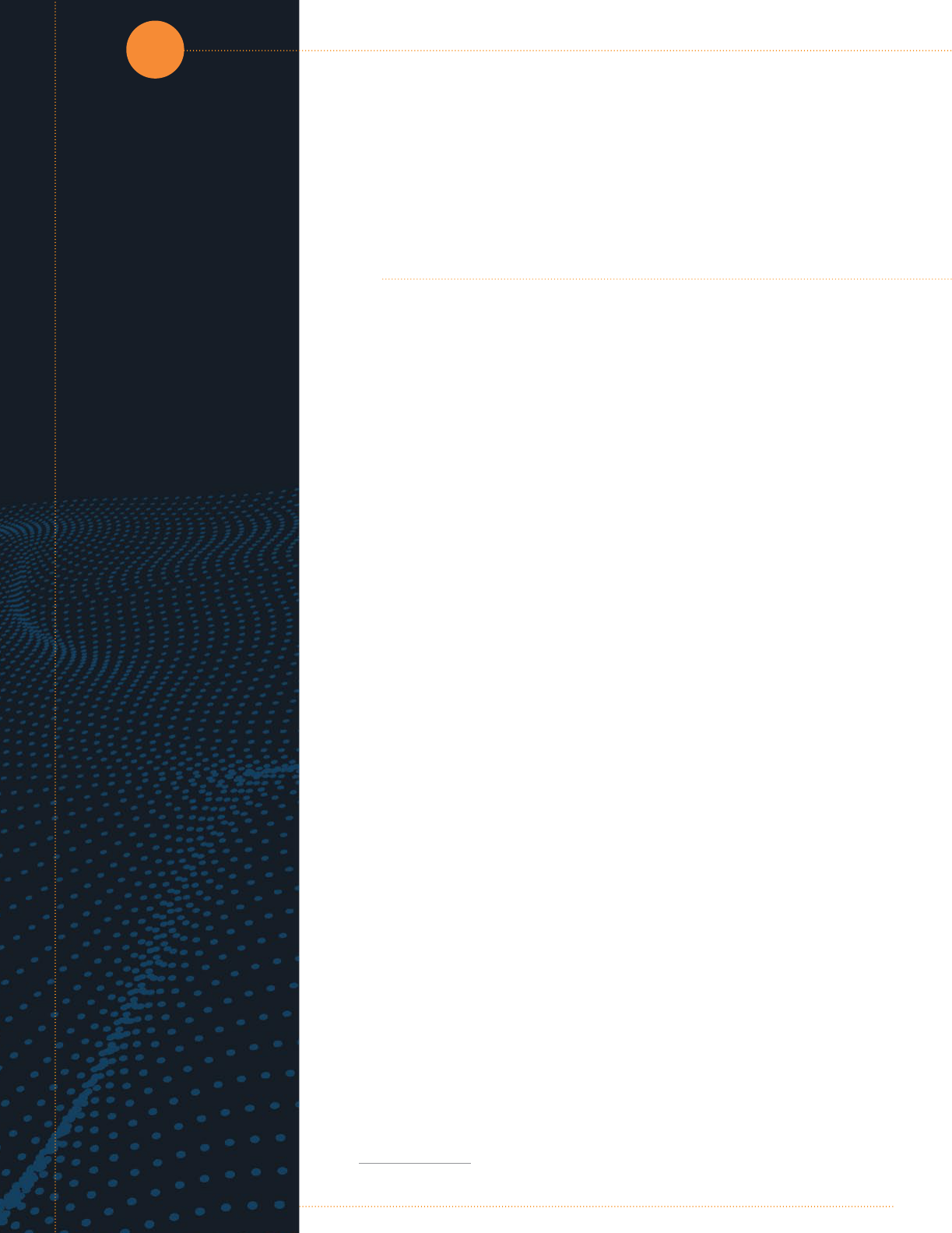
10
WAX Team
Created in 2015, OPSkins quickly became the global
marketplace leader for video game virtual assets. The company
has facilitated over 100+ million purchases annually for millions
of customers across 95 countries. OPSkins built a centralized
solution to address the greatest needs of the marketplace,
reducing friction between buyers and sellers. These challenges
are non-trivial and create a high bar for success: critical mass of
buyers and sellers to create liquidity, settlement execution due
to lack of trust between buyers and sellers, 100% of fraud loss
shifted to the platform rather than the customers, cross-border
execution, multilingual offerings, etc.
In building the number one centralized marketplace, OPSkins’
founders recognized an even greater potential to grow the
market by decentralizing it and giving the power of the
marketplace to millions of video game entrepreneurs and
inuencers who have social graphs, trac, content, and existing
followers. By shifting the parts of the marketplace that are
complex and expensive to build to the video gamer ecosystem
and by decentralizing those components on the blockchain, the
market will grow even faster than it has already, and everyone
will be able to benet from that growth.
2 See http://www.reuters.com/article/us-deutsche-boerse-gaming-idUSKBN13Q4ZG
Normally the place to buy or sell shares in Germany’s
top companies, Deutsche Boerse is launching a new
exchange for people to trade virtual goods from video
games, tapping into a multi-billion U.S. dollar market. -
FRANKFURT (Reuters)
2
“
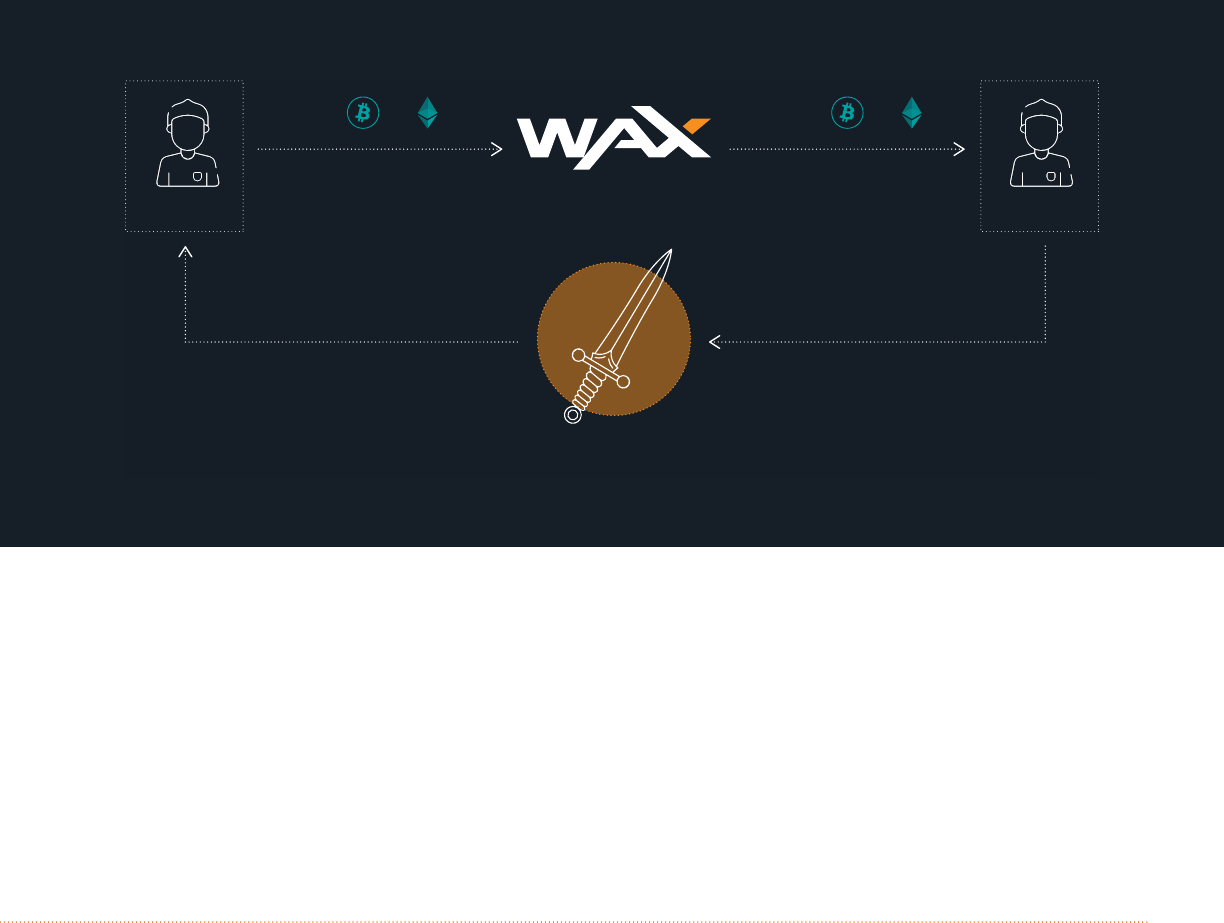
11
WAX Functionality
WAX is a global peer-to-peer marketplace for video game virtual goods
trading based on decentralized smart contracts on the blockchain.
The WAX platform will allow the global pool of buyers and sellers to
access the global supply of virtual goods in a decentralized market
while eliminating nancial risks they encounter from the prevailing
consignment-based marketplace model in use today. Utilizing smart
contracts that incorporate the OPSkins team’s 20 years and billions of
transactions of virtual item experience, WAX supports a platform where
all market participants—listing and selling agents, item settlement
agents, appraisers, aliates, buyers, and sellers—will merchandise,
apportion fees and settle transactions quickly and securely.
Buyer
$
Seller
Game Asset
Wax Exchange
$
What are the shortcomings in the existing ecosystem of decentralized
exchanges? They don’t support the specic needs of the online video
game asset trading market. Here is a comparison to some of the more
well-known offerings.
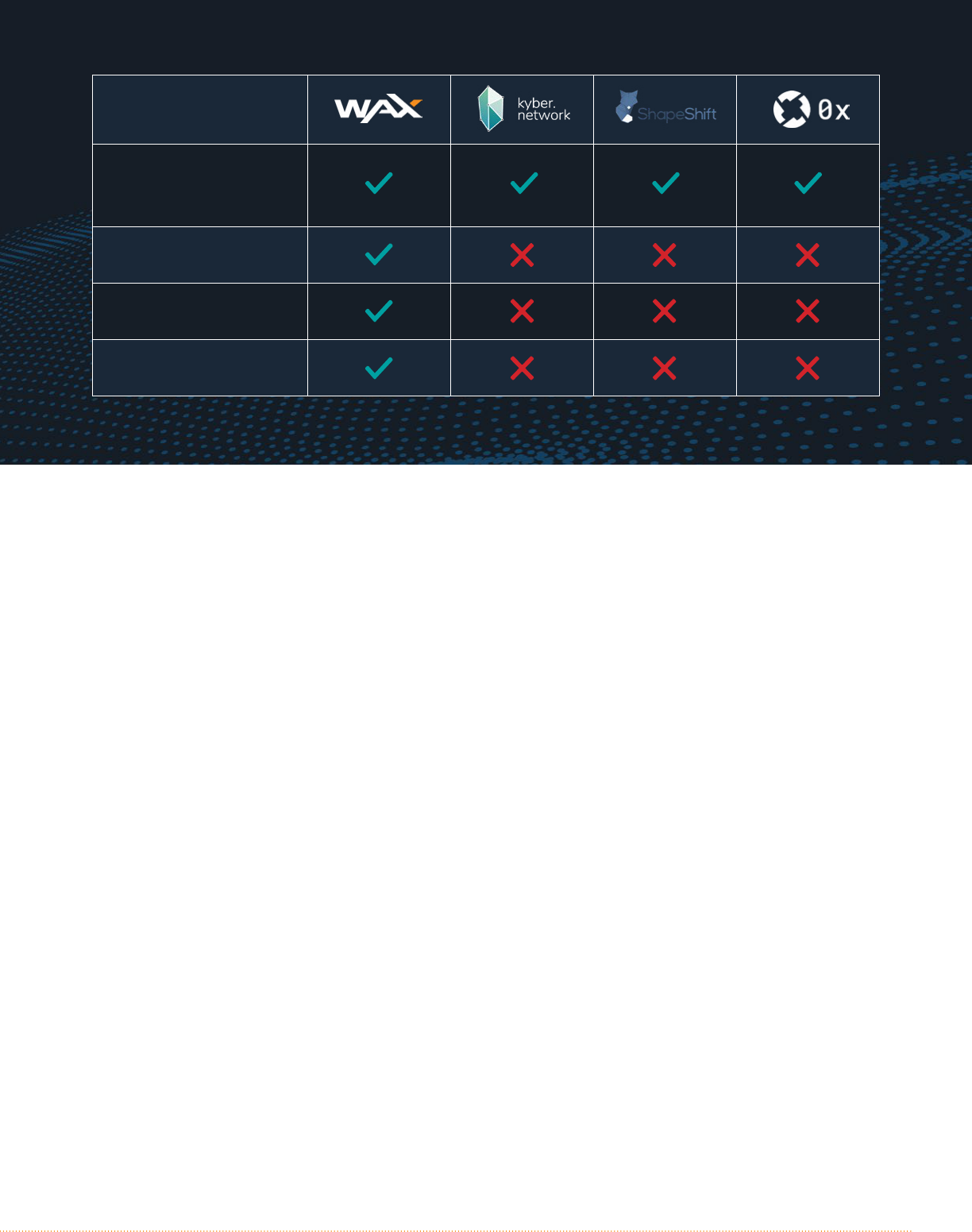
12
WAX Protocol
The WAX Protocol is a decentralized blockchain solution that focuses on
the transfer and exchange of virtual goods and services. This protocol
is focused on serving the rapidly growing gaming industry but is exible
enough to meet a variety of other use cases.
WAX intends to meet the needs of customers who use a huge number
of gaming platforms—each with their own exchange model and transfer
conditions—while supporting the entire network. To meet the high
throughput demand of these markets, a Delegated Proof of Stake (DPOS,
further explanation below) consensus algorithm was selected, with
selected conrming nodes, or “Guilds”, focusing on a single game.
WAX Tokens
WAX Token (market abbreviation WAX) is the native token of the WAX
Platform, and supports all activities and functionality on the WAX
Platform.
WAX Token is a platform utility medium that enables users to list items
for sale, transact value between each other, settle the transfer of virtual
goods, create and service contracts, and propose and vote for WAX
Decentralized
Exchange
Multi-Party Payout
Settlement Agent
Asset Agnostic
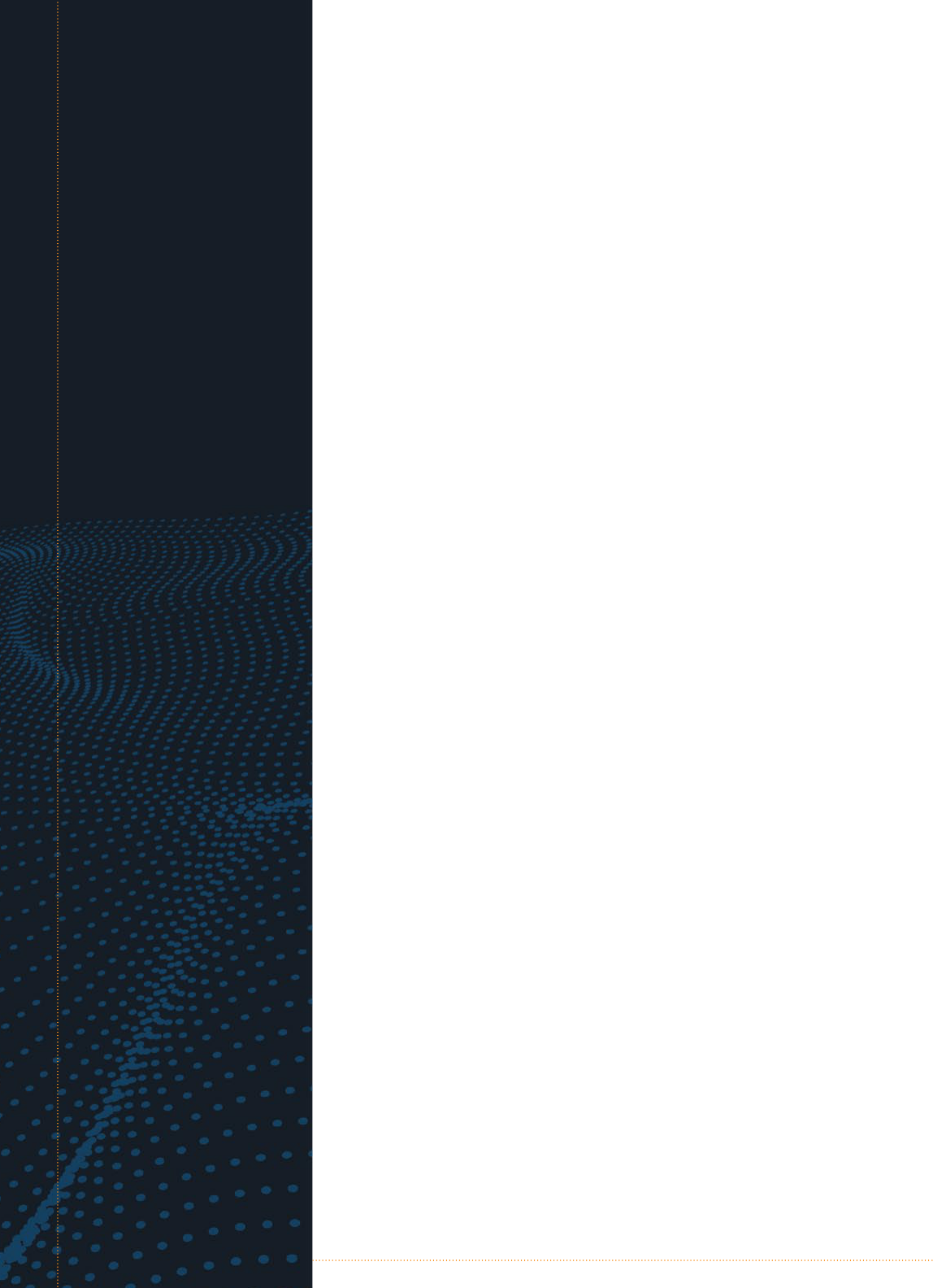
13
Guilds. The application of WAX Token is entirely focused on
these functions, and developed to strongly enforce security
during digital exchange.
Virtual goods’ sales prices are listed in WAX Token; when a user
wants to purchase the virtual good they pay with WAX Token. If
the item is listed in a different currency (through a site linking
to the WAX Platform), the WAX Token must be converted by the
listing agent at the current exchange rate at time of purchase.
The number of votes a user can distribute to one or more
Guilds is equivalent to the number of WAX Tokens such user
holds. When WAX Tokens are transferred, the vote allocations
are diminished by the same amount, so it is important to hold
a reserve of WAX Tokens to ensure a user’s delegated votes
remain suciently high.
A small amount of WAX Token is also used during transactions
and messages, as a fee for using the network. This fee, similar
to ETH Gas and Bitcoin Fees, incentivizes Guilds to include
transactions into blocks.
All accounts have the ability to transfer WAX Tokens between
themselves and other users. This involves the reassignment of
asset (X) from one account (A) to another (B), with enforcement
that the originating account (A) was in possession of at least
that many WAX Tokens (X) before the transaction was approved.
All settlements on the WAX Platform are conducted in WAX
Token. Since WAX Token is divisible to 18 decimal places
(10-18), the transfer of WAX Token also allows for micro-
settlements, a feature likely to be leveraged for future virtual
goods.
WAX Accounts
On the WAX Platform there are four types of accounts, three
controlled by external agents and one autonomously; Users,
Guilds, Transfer Agents, and Contracts. Each of these accounts
serves a distinct role in the WAX Platform.
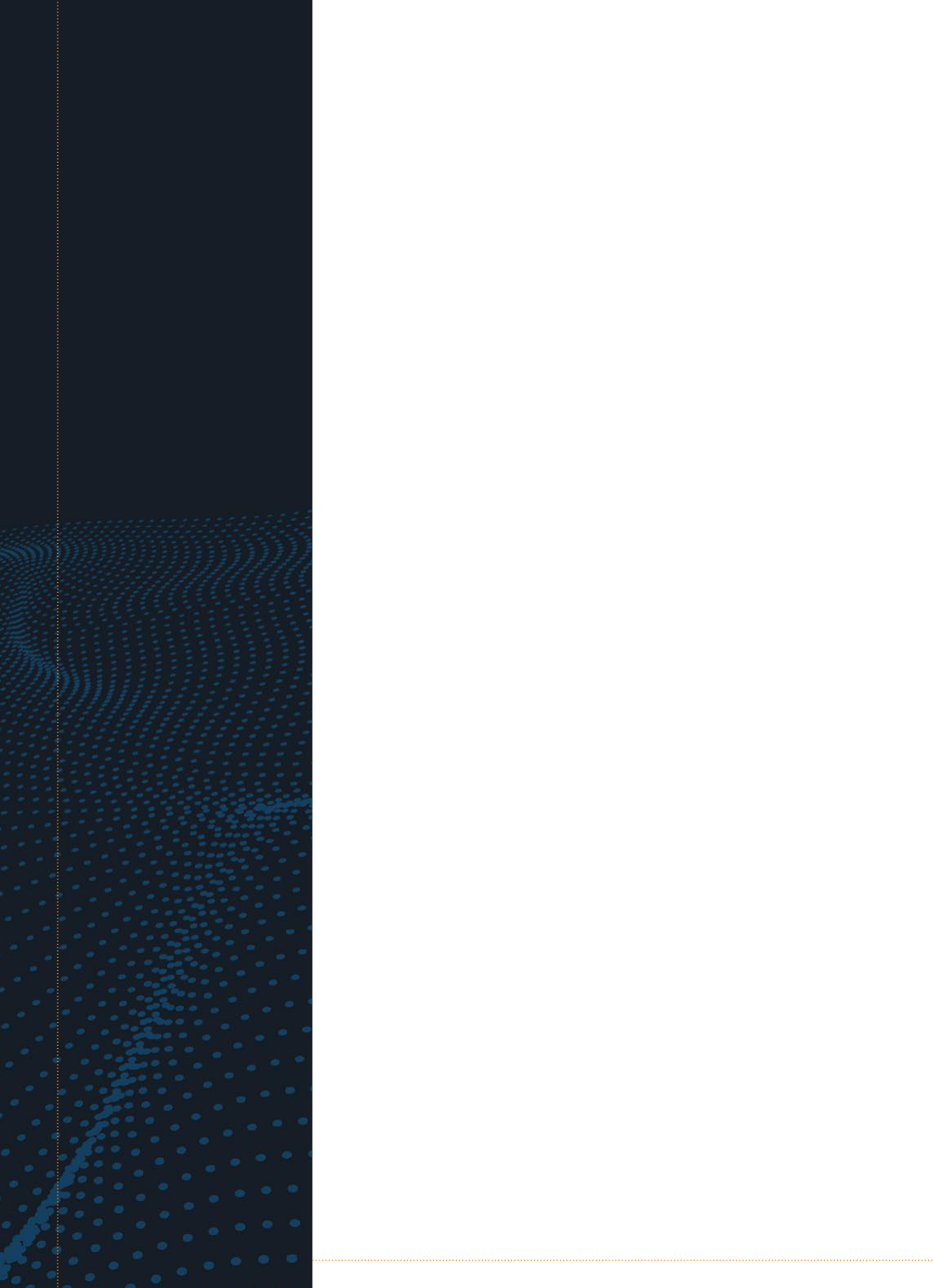
14
User accounts control a single private key, and corresponding
address, with which they create and sign transactions. Users may
control WAX Tokens as well as digital goods, and cannot have
their control of these goods revoked by any other user. Most User
accounts will be proxied by an exchange and listing website (such
as OPSkins.com), though it will be possible for a User to directly
interact with the WAX Platform.
Guilds are the conrming nodes of the WAX Platform and are
elected by DPOS from users. Each Guild is created with a private
signing key and corresponding address, as well as a single public
encryption key and private decryption key that is used in a multi-
party encryption schema for listing assets. Guilds are responsible
for forming blocks of transactions and must sign these blocks
and transact them to other Guilds on the WAX Platform. For
this service, they receive the fees earned within the block, and
periodically transfer a percentage of these fees to their pledged
stakeholders.
Transfer Agents are responsible for the in-game transfer of digital
assets between Users. These accounts control two Hierarchically
Derived (HD) Private Keys. The rst is used to generate a master
address and child addresses for the acceptance and transfer
of virtual goods and WAX Tokens. The second is used to create
unique public encryption keys to accept messages from Users.
Through this channel, Users can securely communicate their in-
game contact info to transfer or receive virtual goods. Each time a
Transfer Agent accepts a Settlement Execution Contract, the WAX
Platform will force the iteration of the HD Key.
Contracts are code stored in the WAX Platform state, that can be
executed by external agent accounts. Contracts created on the
WAX Platform are executed immediately and return the Contract
address and functions. The WAX Platform supports a limited
number of Contracts, such as Proposal, Listing, Settlement
Execution, Request, and Virtual Good.
Delegated Proof of Stake
The WAX Platform uses a type of Delegated Proof of Stake
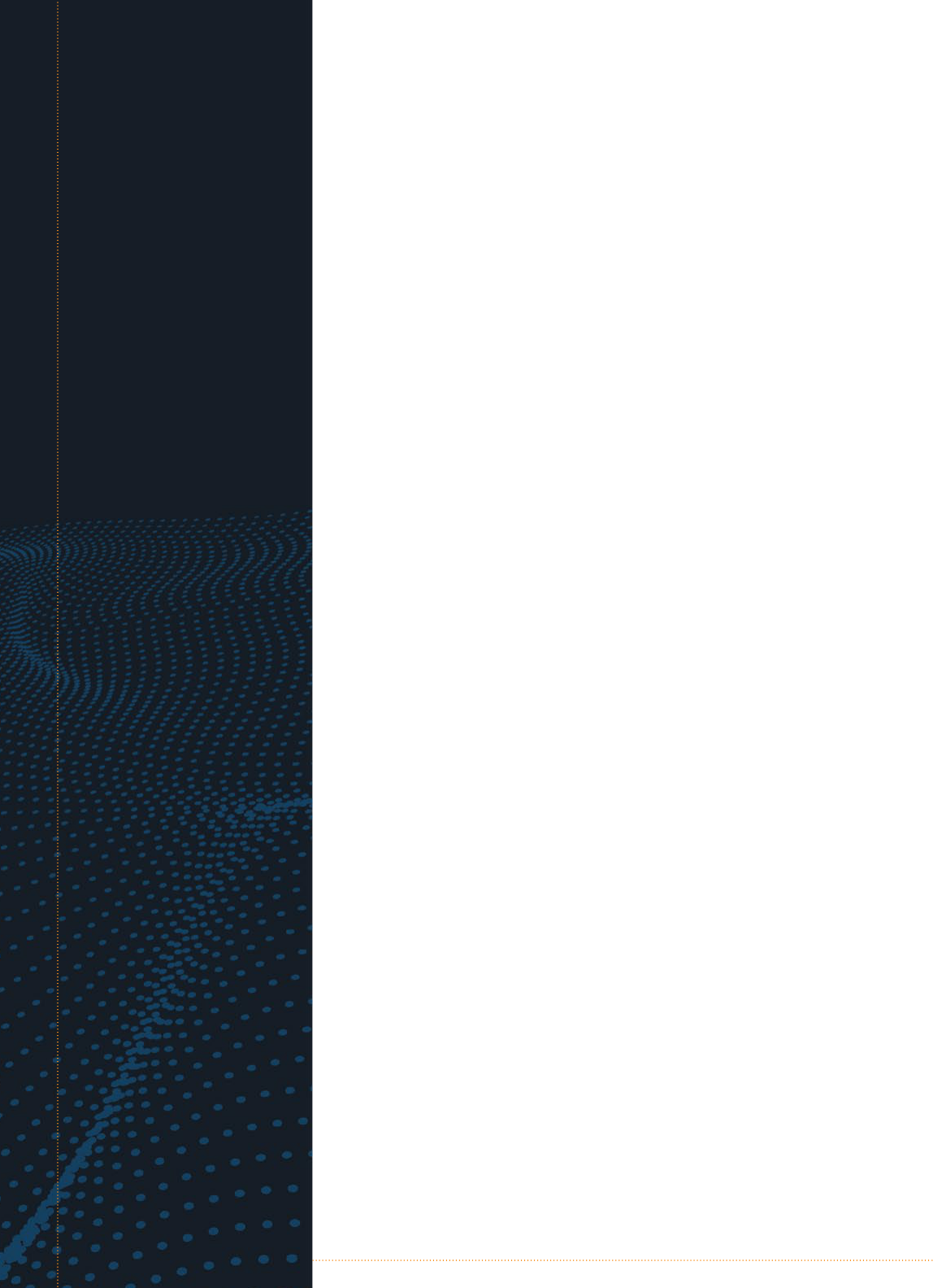
15
(DPOS) consensus algorithm, originally created by BitShares.
This system allows for high transaction throughput, with the
condence of network support and trust.
Unlike a traditional Proof of Work system, conrming nodes
are elected by users who pledge votes to proposed delegates.
Holders of WAX Tokens will be able to submit proposals to the
network for the election of a conrming node, called a “Guild” on
the WAX Platform. Users will vote on the submitted proposals
of potential Guilds, as well as existing Guilds. The WAX Platform
will initially support 64 elected Guilds; Guilds are then ranked
by the number of votes they receive, weighted by the game they
support in their proposal.
Relying on WAX’s user base to elect Guilds (the elected
delegates) will create sucient decentralization to ensure a
secure and trusted exchange. Users and Guilds (but not Transfer
Agents) may pledge their WAX Tokens to proposals but cannot
pledge to themselves.
Users are allowed to pledge only up to a total of eight
proposals—and only one proposal per game or game/server—
preventing large holders from unduly inuencing a single game.
As the user base supports many different titles, this will ensure
votes are cast across numerous franchises and Guilds.
If users begin to lose condence in a Guild, they may switch their
delegated stake at any point to another Guild or proposal. While
this will not force an immediate change in Guild status, it will
alert users who support the Guild.
Users are encouraged to keep their WAX Tokens pledged
through the earning of pledge rewards. A percent of the Guild’s
earned fees will be redistributed to pledged Users, in proportion
to their delegated stake amount. This system allows users to
support the network through DPOS, while also not limiting the
ability to change votes in favor of better Guilds.
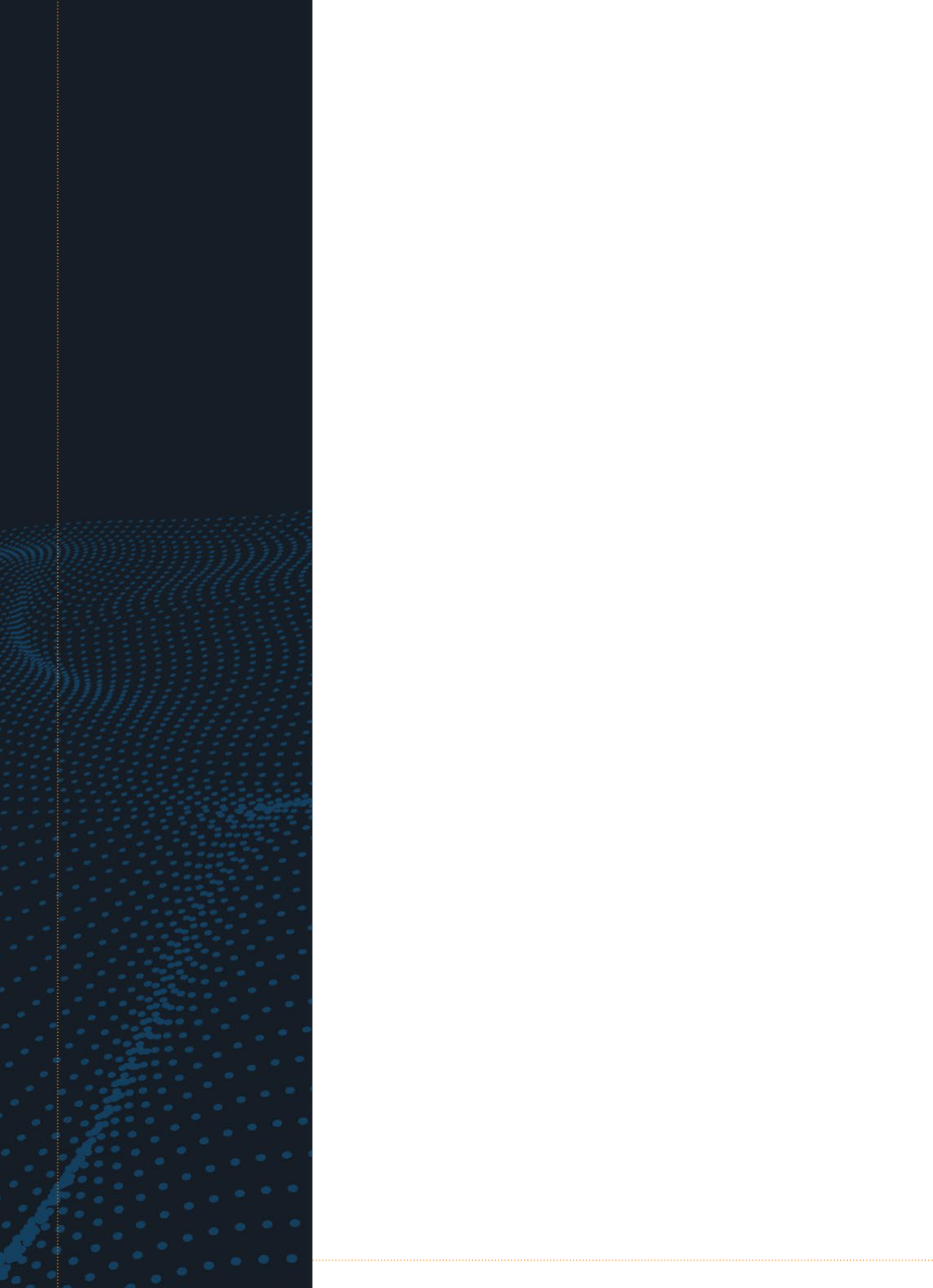
16
Guilds
Guilds are the conrming nodes of the WAX Platform. Guilds will
conrm transactions in a round-robin order. This ensures that
all transactions are conrmed by at least one impartial party
and maintain consensus of the network, while also retaining the
speed and eciency of a DPOS consensus.
While the WAX Platform will have 64 Guild positions upon
release, this will be increased as new games and servers are
released. This is easily signaled by the community presenting
proposals for new games and/or servers not currently
represented by a Guild. If these proposals receive enough
votes during a set time period, the list of Guild positions will be
expanded by eight. This balance prevents the number of Guilds
from outpacing the WAX Platform’s user community, while also
prioritizing user demand for new games and servers.
Beyond consensus, Guilds have additional responsibilities to
promote network health. For a Guild to be elected, they must
rst submit a proposal to the network that states the game they
will service, the percentage of fees they will share to pledged
users, and how they will monitor Transfer Agents. When a Guild
proposal is approved, their public encryption key will be added to
the multi-party encryption schema used for listing on the game
or game/server.
Each Guild will focus on a single virtual good platform game or
game/server. For example, a Guild may be formed for World of
Warcraft “Aegwynn” server. Players of this game or game/server
will therefore be encouraged to support the proposal, while
simultaneously supporting the entire WAX Platform. Popular
games and servers may have more than a single Guild, providing
additional choice in services.
Guilds are responsible for assigning Transfer Agents to a
purchased listing and transferring the contact details for users
to the transfer agent. When a purchase is made, Guilds that
service the items’ game or game/server will be assigned the
transaction. They will assign a Transfer Agent to the purchase,
and the rst one conrmed by the network will become the
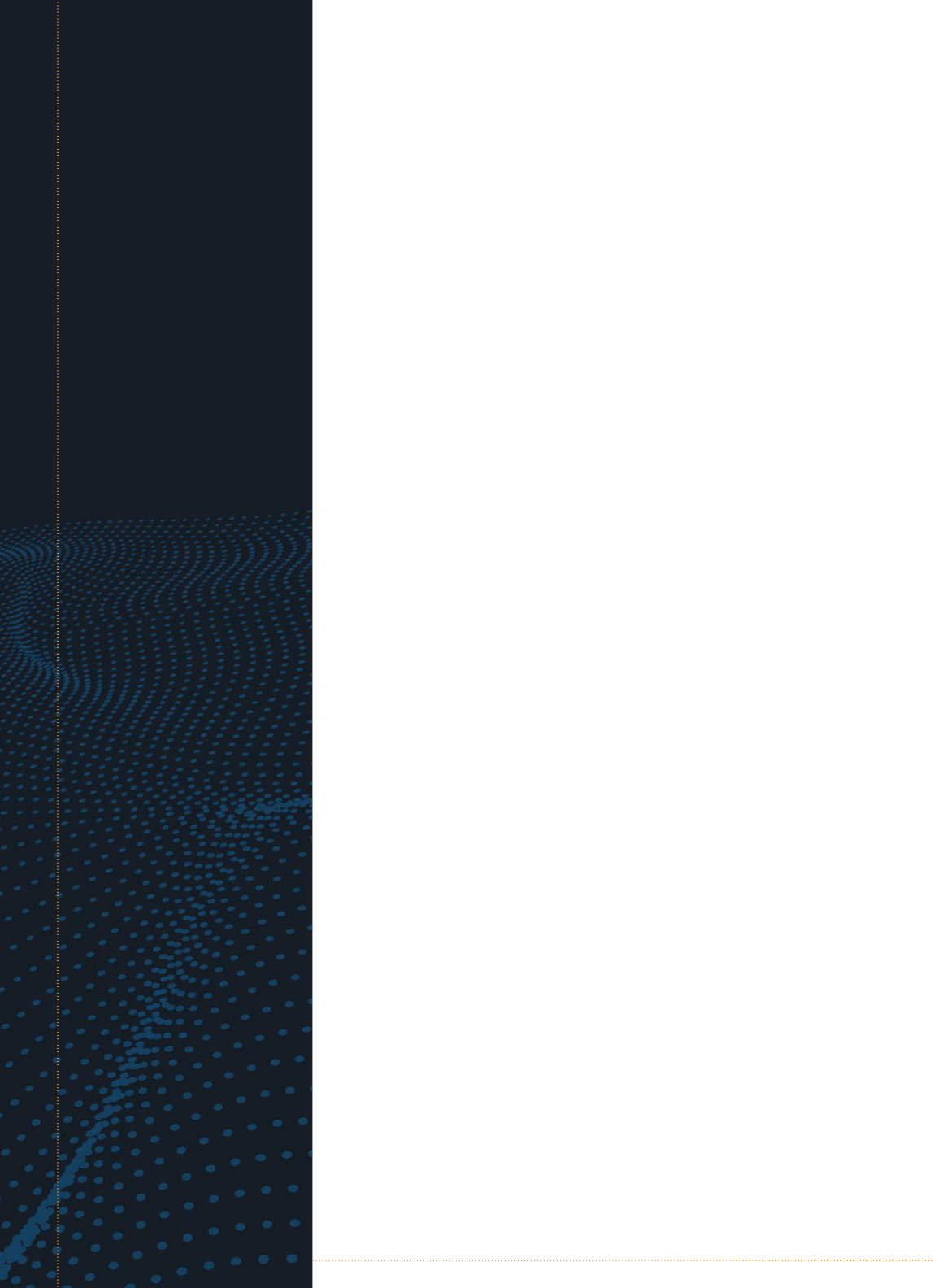
17
accepted record. At this point, the Transfer Agent will have their
HD keys iterated, and the Guild will encrypt a message of the
contact details for buyer and seller to the Transfer Agent. To
ensure this process runs smoothly, Guilds will devise systems to
select Transfer Agents based on proximity to buyer/seller, time
since last transfer assignment and activity level, overall number
of current settlement execution contracts assigned, and—of
course—Transfer Agent’s reputation score.
The Guild’s overall trust score is based on a combination of its
delegated votes from users, as well as the average rating for
active Transfer Agents for its game—a rise in dishonest Transfer
Agents could lead to users switching their vote and the eventual
disbanding of the Guild. As such, Guilds can ban Transfer Agents
who have received a number of disputes.
Guilds are incentivized to high-quality service by receiving a
percentage of the fees on lists, transfers, and Contracts. These
fees are earned on the virtual goods they conrm during their
conrmation turn, with additional bonuses paid out on virtual
goods from their proposal. This encourages competition in the
most popular and expensive marketplaces while providing a fair
fee structure for games with a smaller user base.
Transfer Agents
Transfer Agents are users entrusted to accept and transfer
virtual goods between users. A Transfer Agent is approved
only for one game or game/server, and cannot change its
association. It must also put up a bond of WAX Tokens, of
which it cannot exceed 25% of total value of currently assigned
Settlement Execution Contracts. For settlement execution
services, its will be rewarded a percentage of the fee with WAX
Tokens.
Transfer Agents may signal to the Guild that they are actively
looking for additional settlement execution contracts and are
currently on-line. Conversely, if a Transfer Agent no longer wants
to participate as a Transfer Agent, it must rst complete its
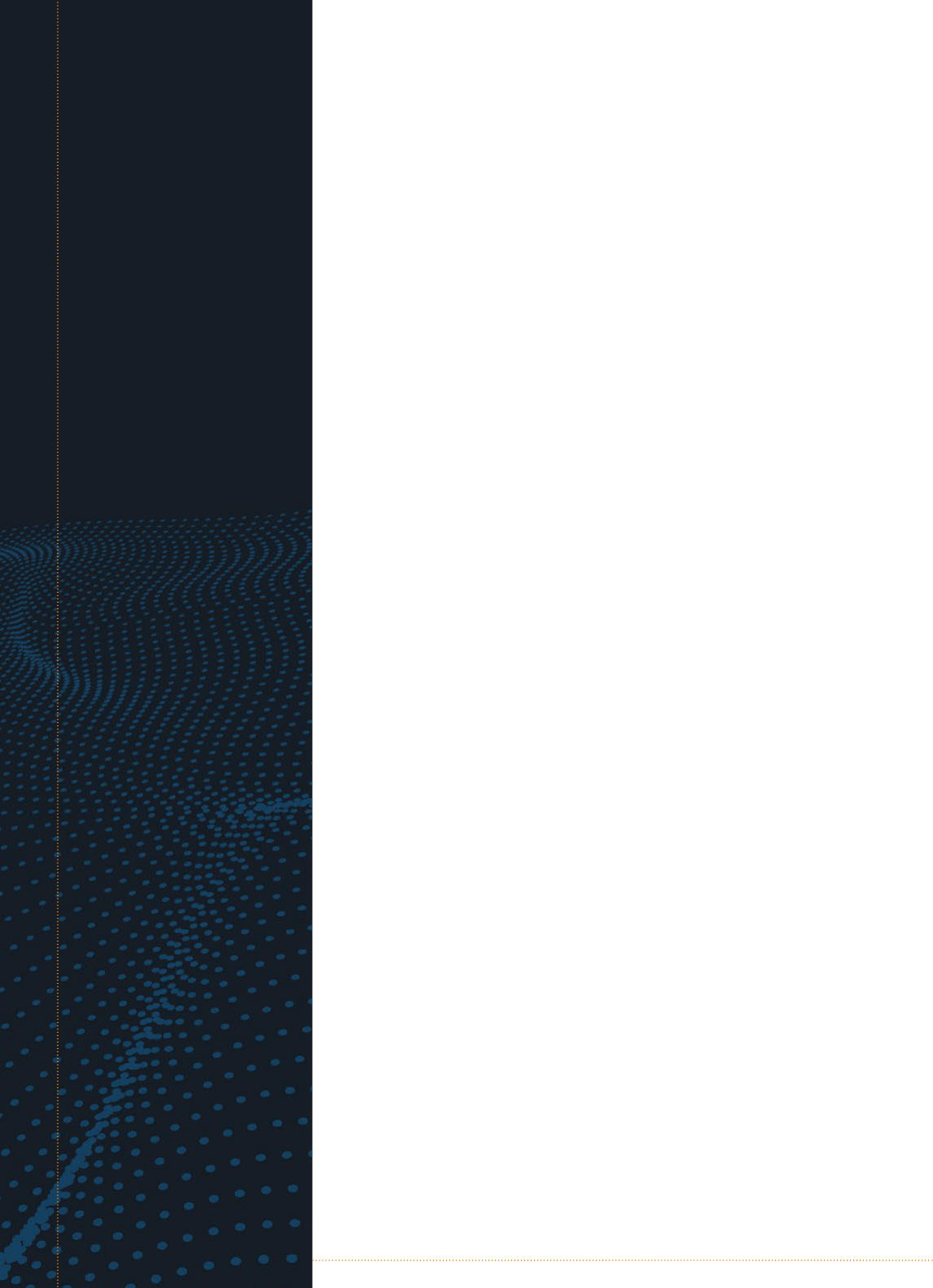
18
assigned settlement execution contracts, and can then signal its
retirement to the Guild. It will then receive its full bond of WAX
Tokens back.
Transfer Agents perform a critical function in the WAX Platform.
Transfer Agents will be responsible for enacting in-game trades
of virtual goods purchased and will be expected to:
1. Communicate with seller and buyer to arrange pick-up and
delivery of item
2. Take control of the virtual asset from the seller
3. Verify the authenticity of the virtual asset
4. Digitally sign the Settlement Execution Contract that they
have received the virtual asset
5. Deliver the virtual asset to the buyer
6. Digitally sign the Settlement Execution Contract that they
have delivered the virtual asset
In addition, Transfer Agents may be called to arbiter disputes
raised by users against other Transfer Agents. These services
are rated by buyers and sellers, and they must maintain a high-
level of quality service or risk being removed.
Transfer Agents’ accounts have two public keys; the rst is a
HD signing address and is similar to other users. The second
is a HD public encryption key, allowing users to send secure
messages with their in-game username, location, trade-URL (i.e.:
for steam trades), etc.
When a Transfer Agent is selected for a Settlement Execution
Contract, the Buyer and Seller will be alerted. They can send
encrypted messages to the Transfer Agent to communicate
meeting logistics. The Transfer Agent can communicate back
(though unencrypted) with clarifying questions or additional
details. This allows the Transfer Agent to meet users in-game
with minimal risk, while also protecting users from Transfer
Agents working with either a buyer or seller to deceive the other.

19
Transactions and Messages
Transactions and Messages on the WAX Platform are any signed
data package that is communicated between accounts. A transaction
refers to communication originating with an external agent, such as a
human user or external bot. Messages are similar to transactions but
are executed by Contracts on the WAX Platform. Both transactions and
messages incur a small fee of WAX Token when called, used to support
the conrming Guilds.
Broadly speaking, there are three types of communications on the
WAX Platform: transfer of WAX Tokens, deployment of Contracts,
and interaction with Contracts. Each can be called as a transaction or
message, depending on the actor. They each are formed as below, with
the sender being implicitly named by the state:
nonce The transaction or message number of the account communicating
waxfee The fee (in WAX Token) associated with the transaction or message type
to Destination address of the receiving account
value The amount of asset being transferred; possible to be blank
data
A call for the WAX Platform to execute the deployment or interaction with a
Contract, as well as any variables to be passed; this will indicate which assets
(WAX Token, WAXT Tether, Digital Asset) are being transferred
signature The ECDSA signature of the transaction/message, signed by sending address
Voting
Users who wish to vote with their WAX Tokens to support a Guild or
proposals can do so easily from their wallet. From the wallet, a user
selects “Proposals” to review the current Guilds and available proposals,
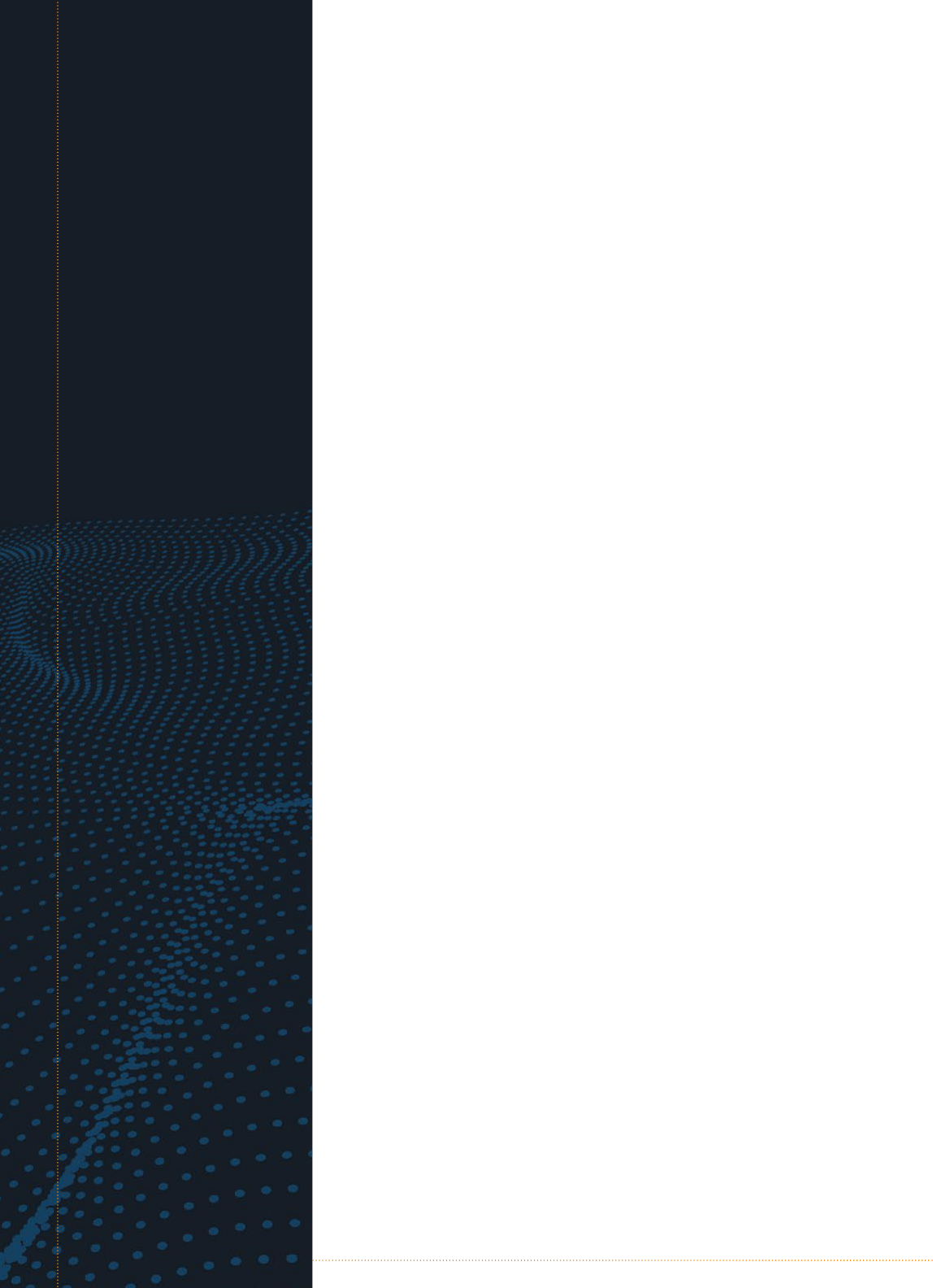
20
as well as their current allocation of delegated WAX Tokens.
Users may vote for up to 8 Guilds or proposals, and their share
of votes (held WAX Tokens) will be distributed evenly amongst
them. The user will select the delegates it wishes to support and
then transact a vote. While voting costs WAX Token fees, the
vote cost is the same whether selecting eight new Guilds or only
swapping one.
Contracts
Contracts refer to executable code on the WAX Platform; on
WAX, there are a limited number of pre-created contracts that
can be executed. As the WAX Platform continues to develop,
new contracts and control features will be merged into the
protocol.
Proposal
The Proposal Contract includes the Guild’s application to be
a conrming node, as well as the list of delegated stake from
users. “Proposal” is a transaction executed by a user, to elect a
new Guild as a conrming node to the network.
A proposal message will include; the game or game/server the
Guild will provide services for; the fee sharing structure between
the Guild and pledged delegates; and address of a user account
to serve as the Guild address during execution. Only users who
have at least 10 WAX Tokens and are not currently pledged to 8
proposals may call “proposal”.
Upon creation, a minimum of 10 WAX Tokens from the creating
user’s account are automatically delegated to the proposal. The
proposal may now receive delegated stakes from other users.
The rankings of proposals are ordered by vote count, and guild
statuses are awarded or rescinded based on the overall rankings
and number of guild spots.
If a proposal for a Guild ever falls below 10 WAX Tokens, the
Guild will be dissolved immediately and the remaining assets
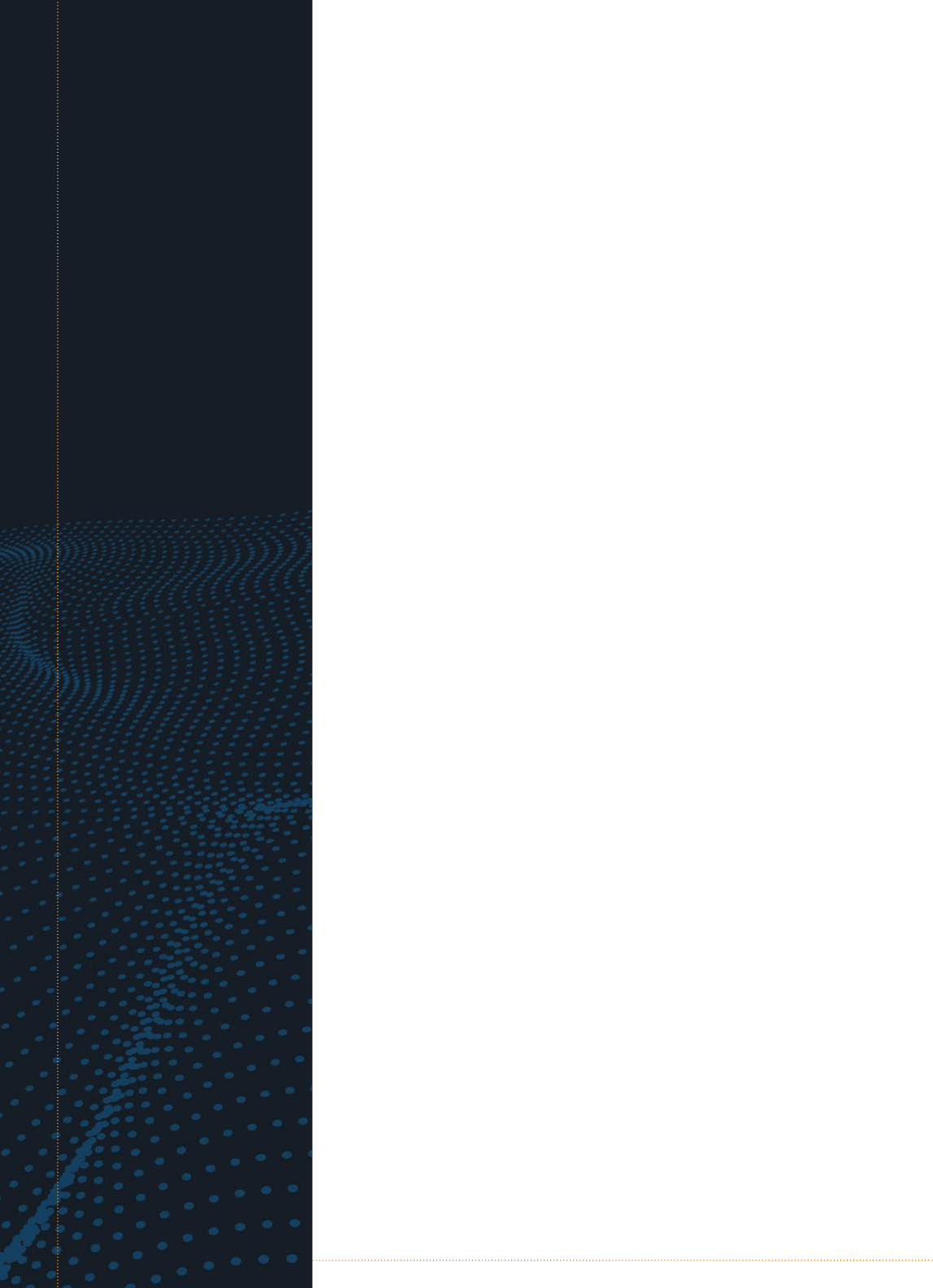
21
transferred to the pledged users. If a Guild wishes to change any
of the features of its proposal it must submit a new proposal
and can signal to its pledged stakeholders for the change.
Rating
Users, Guilds, and Transfer Agents will each have a rating
contract based upon their transaction history and interaction
with each other. When two parties have an interaction with each
other, such as listing/buying or direct transfer, they will have an
ability to rate a user.
The rating is crafted from more than the votes of other accounts:
each transaction, dispute, and settlement is aggregated
and used to calculate the ability for an account to perform a
trustworthy action. Each action type will have a different weight,
but the overall metric will be useful to the entire WAX Platform.
As more transactions occur, the rating system will automatically
adjust for the account. Long patterns of good behavior will raise
an account’s ratings, while short periods of bad behavior can
plummet a rating.
Listing of Virtual Goods
User accounts may list their virtual goods on the WAX Platform
and instantly connect to a worldwide market. When listed,
the virtual good is able to be searched by anyone and can be
displayed easily on websites through the WAX SDK.
“List” calls a Contract transaction, which will create the listing.
To meet this service, a small fee is leveraged in WAX Token
for the listing. In addition, a bounty (list_fee) is placed for the
facilitator, such as the website where the buyer purchased the
virtual good.
A typical list includes the virtual good name, the game or
game/server it is located on, the listing medium, and the price.
Delivery time for the seller to deliver to the Transfer Agent is
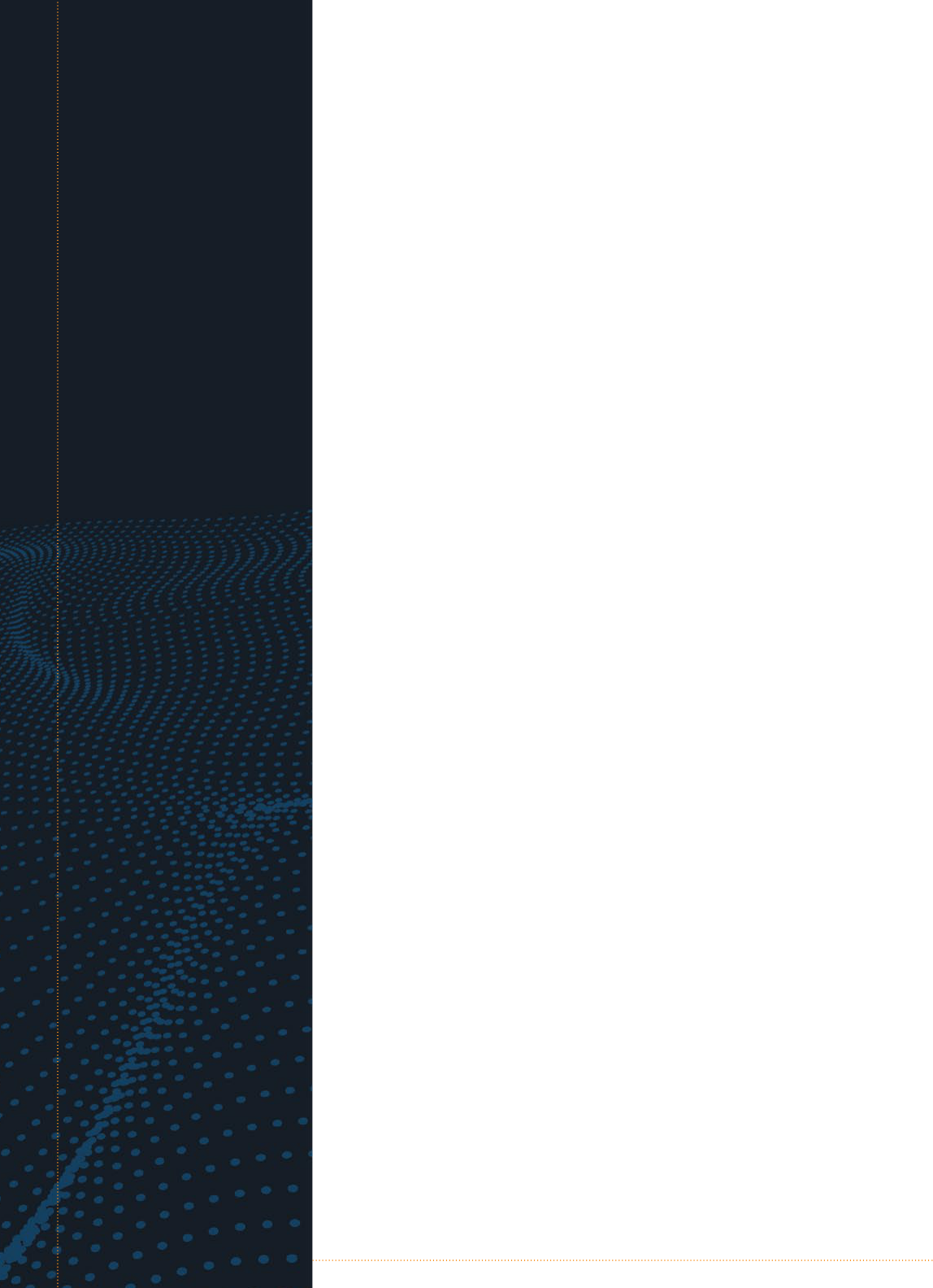
22
also included, and reects the overall price of the asset; shorter
delivery times incur a higher fee, but have less time to complete
before they are found in fault of the settlement execution
contract.
The selling user’s contact information is encrypted using a multi-
party schema which includes the public encryption key of each
Guild serving the virtual good’s game or game/server. This is
also done for the “pick up” URL if available.
The listing user may later invoke this contract’s cancel function
to end the listing and return the list_fee. The wax_fee is non-
redeemable because it was awarded to a Guild for conrming
the transaction at the time of the contract creation.
Purchase of Virtual Goods
Purchasing a virtual good is a function of the list contract. All
users of the WAX Platform have full access to the entire list
catalogue of virtual goods for sale. They can easily browse them
and make choices on their purchase by reviewing historical
pricing data stored in the WAX Platform blockchain.
When a buyer wants to buy a virtual good, it can then purchase
the item listing by sending a transaction to the listing contract
with the requested amount, plus a settlement execution fee. This
can be transacted easily in WAX Tokens, which can be converted
by external parties into other currencies at the time of purchase.
The buying user will also submit their contact information after
encrypting it with the multi-party schema comprising the keys of
each Guild serving the virtual good’s game or game/server. This
can also be done for the “drop off” URL if available.
When the purchase transaction is complete, a Settlement
Execution Contract is deployed via message.
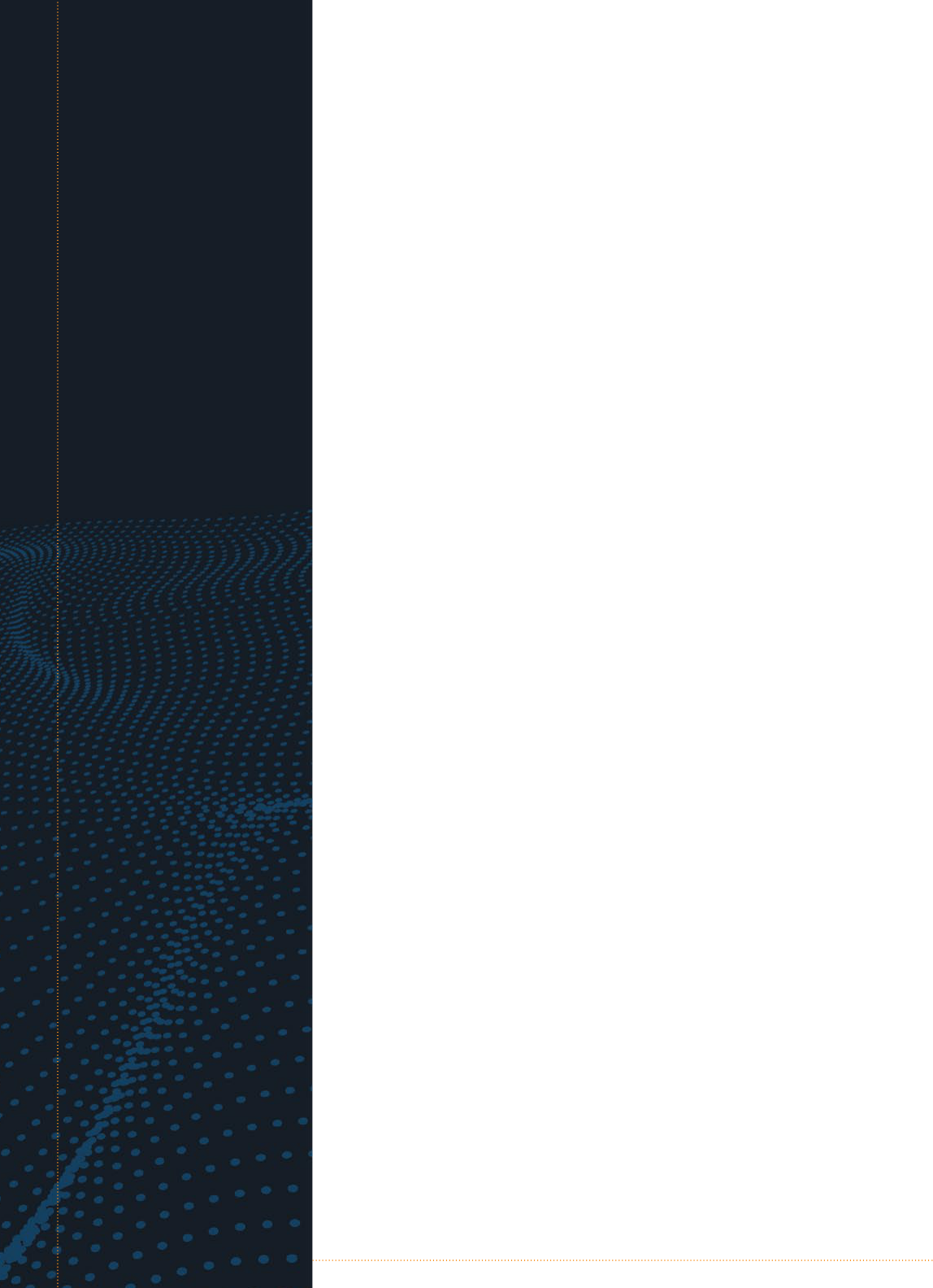
23
Settlement Execution Contract
Settlement Execution Contracts will be deployed by message
from a list contract following the purchase function being
successfully called. The transferred assets used to purchase the
listing, details from the listing, and the encrypted contact details
will be transferred. At this time the list_fee is transacted to the
address of the intermediary through whom the buyer purchased
the goods. If no intermediary was used, the list_fee will be
returned to the seller.
Guilds for the game or game/server will then compete with
each other to select a Transfer Agent from their active list. The
Transfer Agent is responsible for acquiring the virtual good from
the seller, and ensuring delivery to the buyer. Only one Transfer
Agent can be selected for a Settlement Execution Contract.
The Guild will next decrypt the messages containing contact
information and securely encrypt a new message to the Transfer
Agent with contact details and timestamp. The Transfer Agent
will then arrange to meet both buyer and seller in the game or
game/server, or transfer the virtual goods via “pick up” and “drop
off” URLs.
In either case, the seller must then transfer the virtual goods to
the Transfer Agent. When the virtual good has been delivered,
the seller will sign a transaction to the Settlement Execution
Contract conrming the trade. If the seller fails to deliver the
virtual good, it will receive a negative rating: low ratings may be
ignored by other users, and if a seller has a rating that is too low,
its listings will be removed by the Guild.
When the Transfer Agent receives the item, it will then conrm
the virtual good’s authenticity. If the item is as described in the
listing, the Transfer Agent will sign a message to the Settlement
Execution Contract. If both signatures from the seller and
Transfer Agent have been collected, the purchasing funds will be
released to the seller.
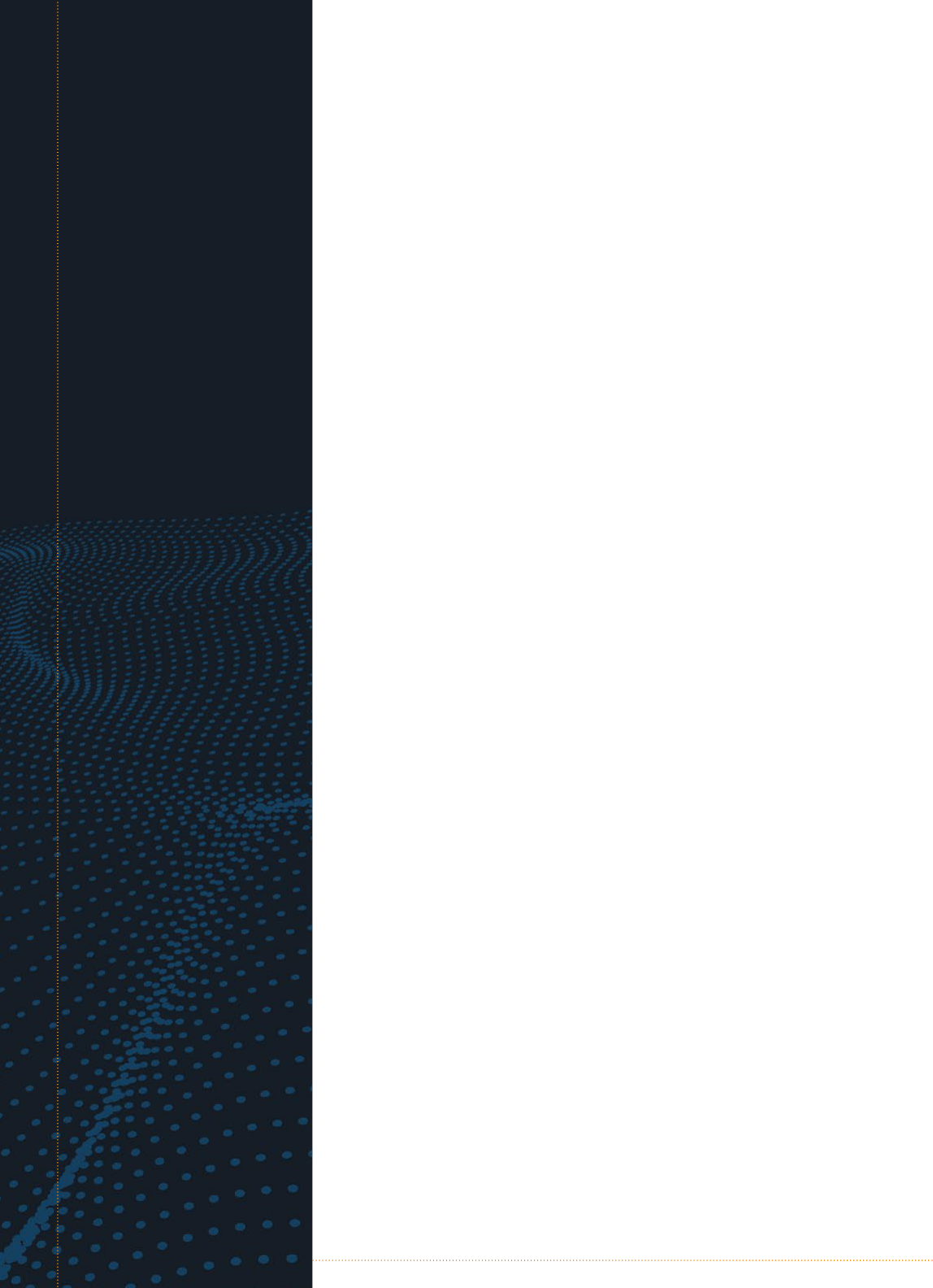
24
With the virtual good in its custody, the Transfer Agent next
contacts the buyer. When contacted, the virtual good is
transferred to the buyer. A second signature from the Transfer
Agent conrms the delivery, and the settlement execution fees
are released to the Transfer Agent.
Dispute
For disputes against a Transfer Agent, a user creates a contract
with a bond equal to half the disputed amount. Additional details
such as Transfer Agent address, the listing, settlement execution
contract hash, and assigning Guild are also included
Upon receipt, the Guild must select a neutral Transfer Agent
to arbiter the resolution. This Transfer Agent will review the
transactions that took place, and may request additional
documentation from users and Transfer Agents.
Using this information, the arbiter will make a decision of nding.
If the dispute contract is true, the Transfer Agent’s bonded WAX
will be deducted for the dispute value, plus 10%. No funds will be
sent to the arbiter, but its rating will be increased.
Transfer of Digital Goods
Certain publishers may allow the creation and trade of digital
goods directly; for these games or game/servers, the WAX
Platform will tokenize the virtual goods. These tokens are
representations of virtual goods, and are each unique and
therefore non-fungible. The WAX Platform achieves this through
an asset tokenization smart contract that records the virtual
goods information and metadata into each token minted.
For a qualifying digital good, the item will be digitized at the time
of listing. When the tokenized good is purchased, this asset will
be transferred directly to the buyer, and the seller immediately
paid. Services outside of the WAX Platform will transfer the
asset between the two parties, to ensure the state of ownership
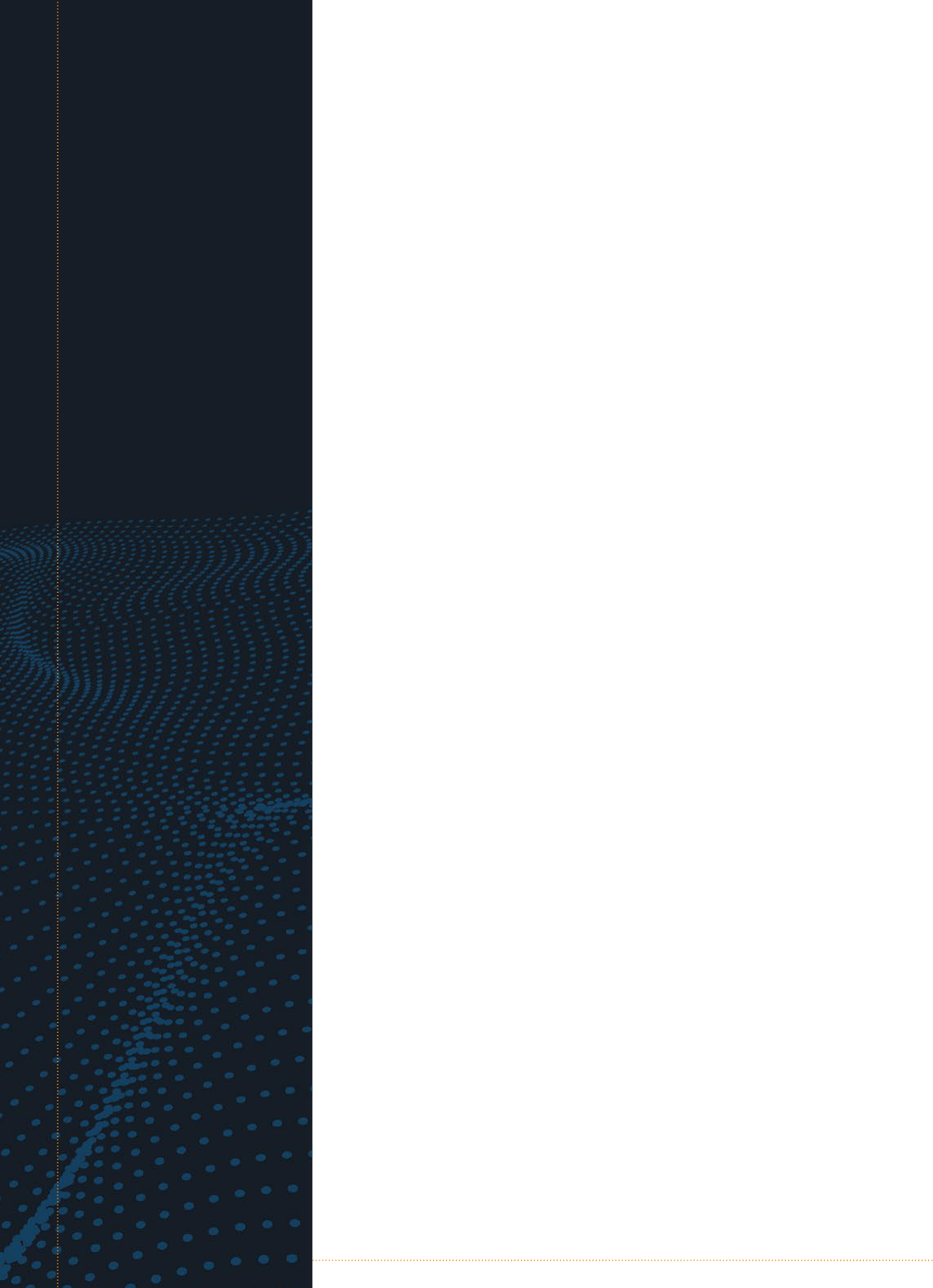
25
matches the game or game/server conditions.
OPSkins currently uses a centralized approach to support a
dozen games. By implementing the above on the WAX Platform,
65 games would be immediately tradable.
WAX Applications
WAX Connect
WAX Connect will be a browser-based SDK that provides a set
of functions to allow building listing widgets, performing wallet
transactions on remote wallets, and performing seamless
onboarding of new users into the WAX Platform. WAX Connect
will perform automatic node discovery based on guild (game
or game/server) aliation and enables retrieval of listings from
guild nodes.
WAX Node
WAX Node is the “full node” that will be run by Guilds and other
ecosystem participants. A WAX Node is required to function as a
Guild and to allow bonding of Transfer Agents.
Additionally, a WAX Node provides a gateway to the overall WAX
Platform, including node and Guild discovery, API endpoints
for WAX Connect and WAX Wallet, and possibly a naming
service. Each WAX Node will hold a complete copy of the WAX
blockchain.
WAX Wallet
WAX Wallet allows non-guild WAX users to hold WAX Tokens
and participate as a DPOS delegate.
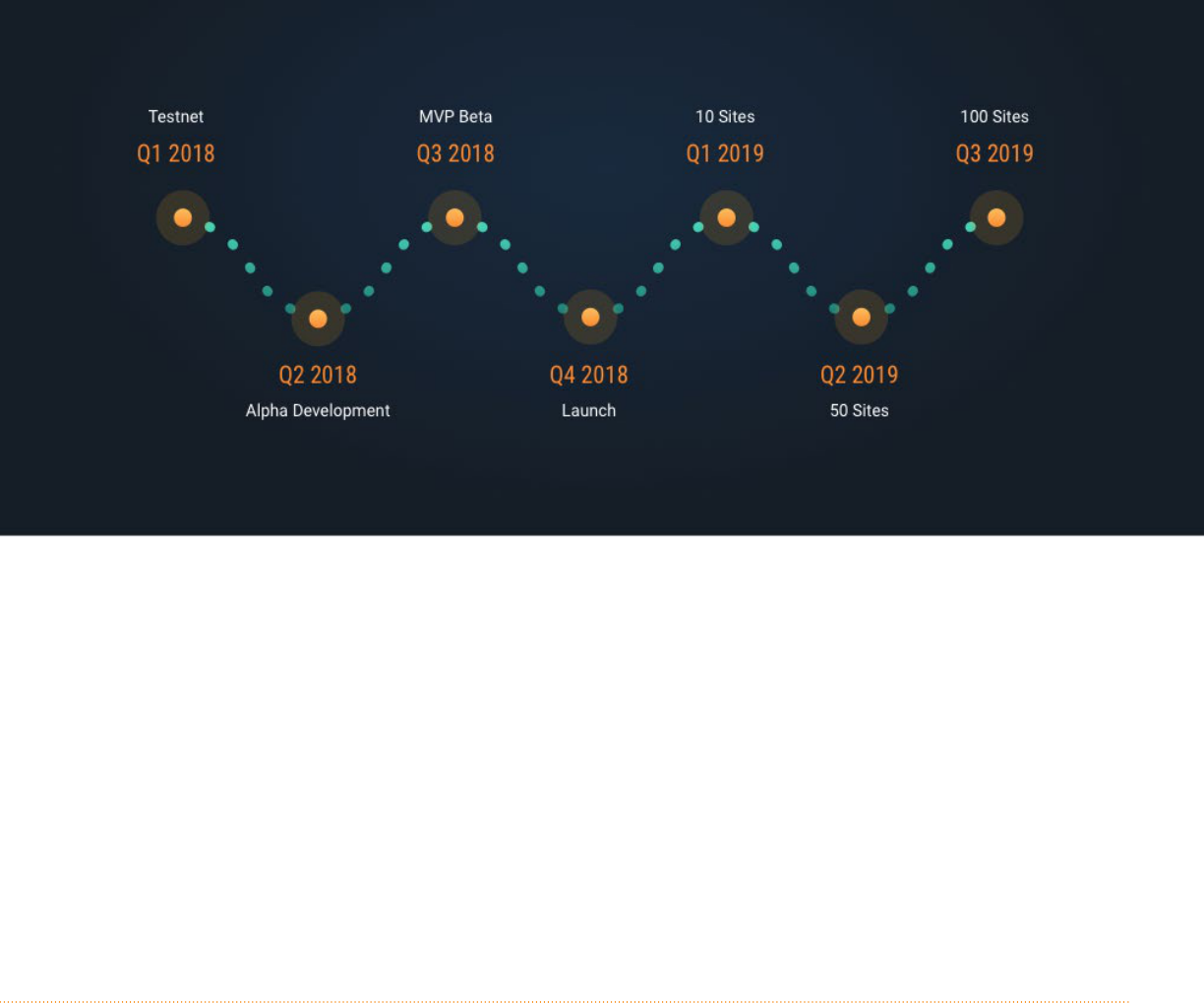
26
WAX Core
WAX Core will be an SDK that encapsulates the common functions of
WAX Node and WAX Wallet. WAX Core will enable forging of delegates,
provide blockchain synchronization, and include the complete developer
API. WAX Core is for those who intend to build on top of the WAX
Platform.
WAX Roadmap
WAX Token Sale
The total supply of WAX Tokens that will ever be created is
1,850,000,000. All WAX Tokens will be generated in a seed block and
distributed according to the chart below. The information provided
on token creation, process, allocation and use of sale proceeds is the
current plan, but is subject to change in WAX’s discretion.
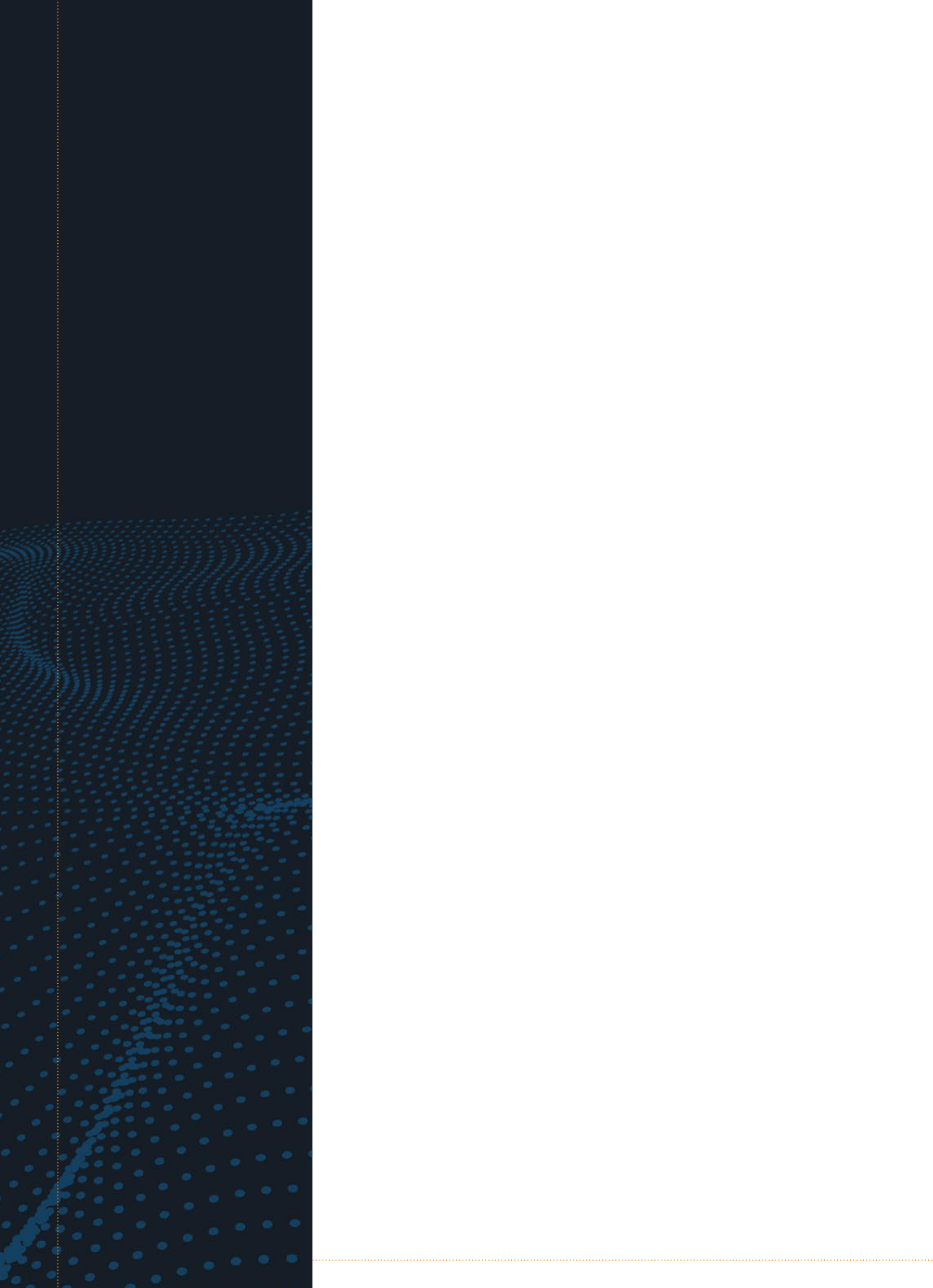
27
Token Sale
64,750,000 WAX Tokens were sold in the WAX Token sale.
When WAX Tokens are issued, all contributors will receive
10x the number of tokens they purchased. The reason we’re
issuing 10x the tokens is because it will be more convenient
for users of the token. It will make microtransactions more
easily calculable, and since WAX was designed to facilitate the
millions of daily microtransactions for digital items, this is an
important feature to include for WAX users.
Market Development
30% of WAX Tokens were, or will be, issued to encourage new
developers to take part in the growing marketplace. These
tokens will be distributed to new developers and publishers to
incentivize them to release virtual goods that can be traded
on the WAX Platform. This provides a new indirect distribution
channel for game developers while allowing market demand
from the gaming community to shape games we love.
Contributers and Advisors
15% of WAX Tokens are, or will be, held by the early
contributors and advisors. This group has contributed 16,800
ETH to acquire 5,040,000 WAX Tokens. Some contributors
and advisors have received, or will also receive, free bonus
tokens for the advisory work they will be doing for WAX. These
tokens cannot be immediately transferred due to time-based
restrictions on their use.
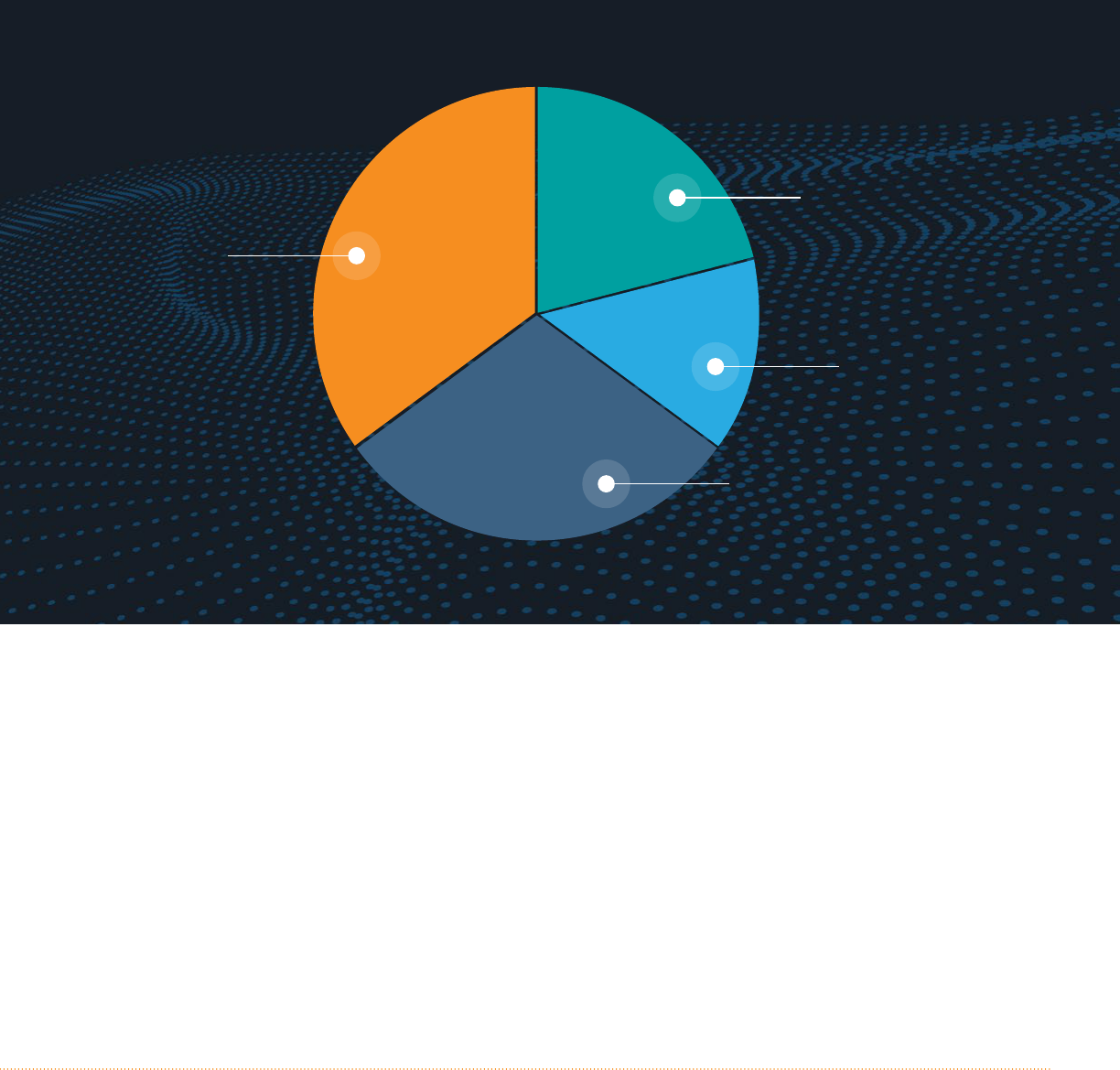
28
WAX Team and Founders
20% of WAX Tokens are being, or will be, retained by WAX and reserved
for development, team, and founders who will continue to enhance the
WAX Platform with valuable updates and their use of these tokens will
also be time released.
Token Sale
35%
Market Development
30%
Contributors and
Advisors
15%
WAX Team and
Founders
20%
Token Sale Process
The WAX Token sale has concluded.
ERC20 WAX Tokens will be distributed to participants of the WAX Token
sale no later than December 29, 2017.
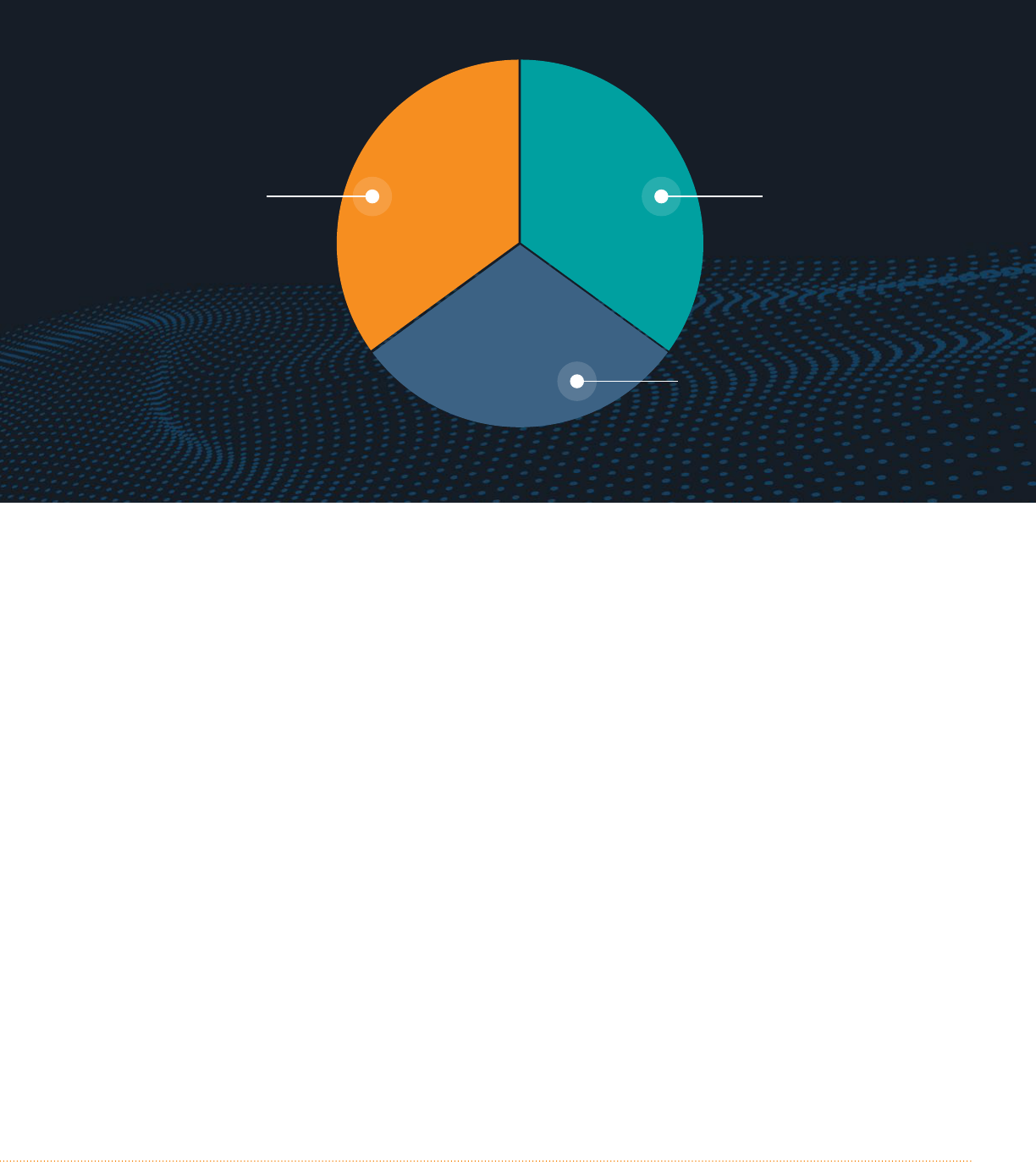
29
Use of Proceeds
Operational Overhead
35%
Software Development
35%
Market Development
30%
ETH received during the token sale will be immediately leveraged to
support WAX’s on-going development and operations.
Legal Requirements
Tokens, the blockchain and smart contracts are nascent technologies.
The application of existing laws to new technologies is often unclear.
The laws that may be implicated by the WAX Platform and tokens are
numerous given its worldwide reach. As a result, the legal and regulatory
issues surrounding the WAX Platform and tokens are complex and
undened at this time. As these issues are settled, modications may
need to be made to the WAX Platform and WAX tokens to comply with
applicable law.

30
Summary & Conclusion
Current online video game trading of virtual assets for Online Games and
other online gaming types is approximately $50 billion. OPSkins, the world’s
largest video game virtual goods trading marketplace with millions of
registered buyers and sellers, is developing WAX to expand virtual asset
trading. As Amazon is to physical goods, OPSkins is to virtual goods.
Amazon built the “Amazon Marketplace” allowing millions of entrepreneurs
to open up their own trading virtual store. Similarly, OPskins is building a
decentralized “WAX Platform” allowing millions of traders to create their
own virtual store, starting with thousands of gaming sites today in the
virtual goods ecosystem. With WAX, millions of individuals can create
new businesses based on their passion for video games offering buy, sell,
rent, or trade capabilities to their social networks, extending the market far
beyond what it is today.

31
Appendix A
WAX Use Case

32Appendix A
Appendix A: WAX Use Case
The way gamers interact with their games, and with others playing those games, has
evolved rapidly during recent years. Casual streaming services like Justin.tv have given
way to professional gamers, a new category of sporting called “esports,” and companies
looking to get a foothold in the online gaming world.
Given the global audience and the youth of their fan base, it’s no surprise that many
advertisers use esports sites like Twitch, Youtube Gaming, Smashcast, and Mirrativ to help
build their brands. These sites push the viewing experience a step further. Unlike traditional
sports broadcasting, they offer an interactive experience to visitors who spend money on
their favorite video games and other online experiences.
Imagine things from the point of view of the gamer.
He visits his favorite streaming site and interacts not only with the content but also with
other gamers. As he watches, he is also chatting with others. Comments y whenever
there is really great action or an incredible kill. Like many of his friends, he’ll be on the site
for several hours.
He notices that the players have some unique looking skins. Their guns have a beautiful
dragon design that he’s never seen before. He thinks, “Wow, I would love to have a skin like
that.”
Before WAX, he had to visit a centralized marketplace or engage in makeshift one-on-one
transactions to buy skins and other virtual goods. With WAX, though, getting new skins
is as easy as clicking on a listing widget that is easy for any site to implement and that
allows painless onboarding to the WAX Platform.
The widget, implemented as a simple set of tags that any site can deploy, is congured
to align with a specic Guild. Each game can have one or many Guilds, but no game can
be represented on the WAX Platform if it doesn’t have at least one Guild. Most of what a
Guild does - running a full WAX node and carrying out certain responsibilities to aid in the
functioning of the WAX Platform - is transparent to both the listing site (where the widget
appears) and the potential buyer.
The buyer has to know only that he is interested in virtual goods from a specic game and
the listing site simply congures the widget to offer items from that specic game. The
widget queries the WAX Platform to retrieve items from the global virtual goods database
that is maintained by the network of nodes in the platform. Using available information,

33Appendix A
the widget then chooses which item to display and the potential buyer can examine the
currently displayed item or page through and examine additional items all priced in WAX
Tokens.
Once the potential buyer decides to purchase, he simply selects “buy now” in the widget
and is presented with an authentication window. If this is the rst time he is interacting
with the WAX Platform, he’ll be taken through an onboarding process that creates an
identity, allocates a WAX Wallet, and allows him to fund the immediate purchase, all
without forcing him to understand WAX, the WAX Platform, or WAX Tokens. From the
buyer’s perspective, all that is required is to select an item, provide payment, and, a short
while later, the item shows up in his personal inventory without him ever leaving the site he
was visiting.
He is delighted with the experience. Buying skins before meant he had to go to a
centralized marketplace service like OPSkins. Going from streaming site to the various
fansites he regularly visits, he sees this same widget allowing anyone to search, browse
and buy virtual goods.
This ability to buy a virtual item anywhere at any time is what no one else provides today.

34
Appendix B
Marketplaces Create Wealth
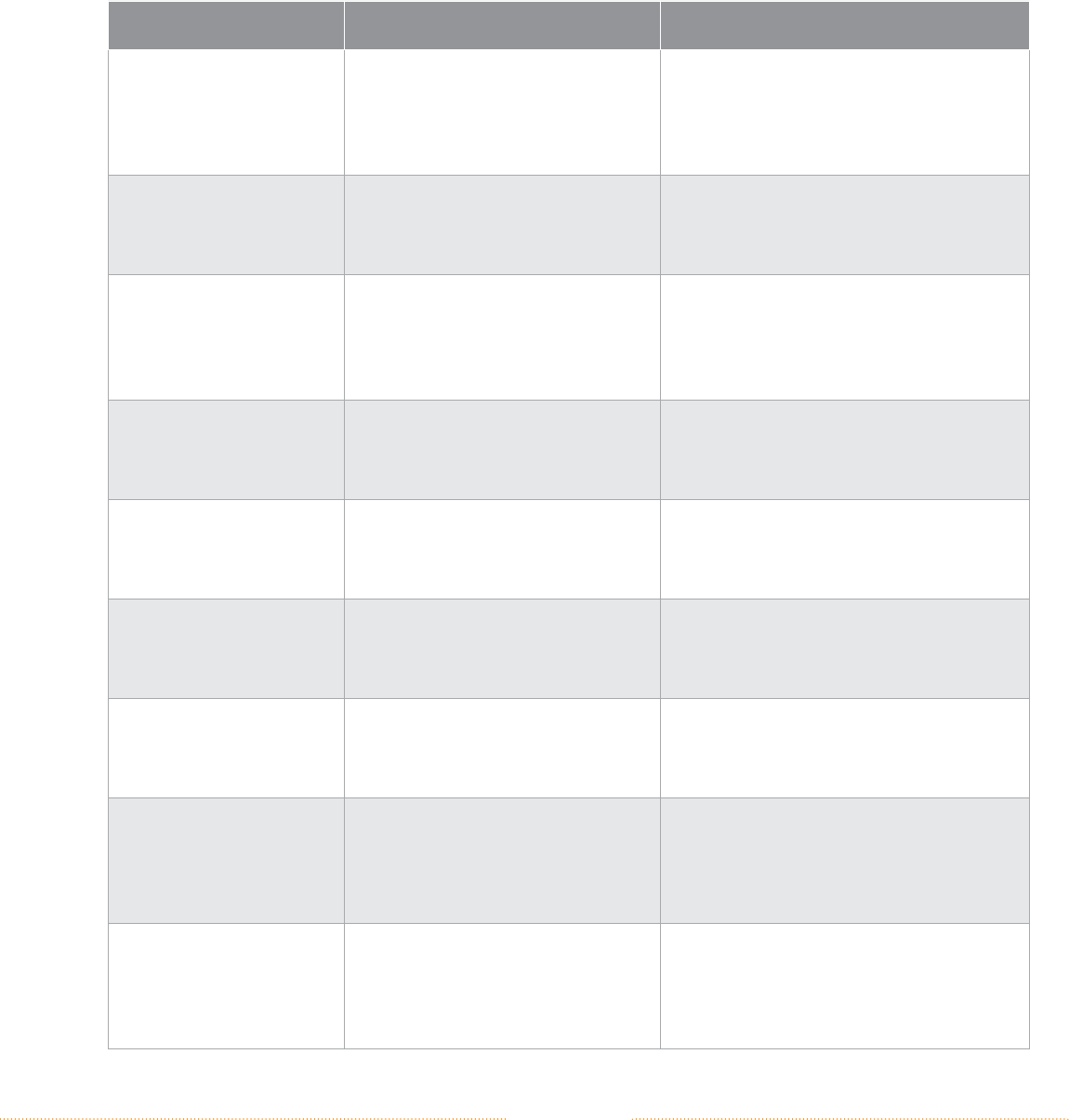
35Appendix B
Appendix B: Marketplaces Create Wealth
The rise of the Internet has enabled digital marketplaces to generate hundreds of
billions of dollars of wealth for buyers and sellers using nine core principles to create the
ecosystem for growth and wealth creation where it would not otherwise exist.
Core Principle Analog Example Digital Example
Expanding distribution
from local and regional
markets to national and
global markets
The Silk Road connecting Far
East and Europe vs insular trade
created new markets and wealth
for many
Garage-sale and swap meet
entrepreneurs become powersellers
on Amazon; homeowner AirBnB hosts
selling to a global audience
Making money passively
with minimal effort
Income from parking lots or
Intellectual Property (IP) rights
Playing video games for a living
(eSports); using aliate marketing or
social graph to earn a living (inuencer)
Guaranteed settlement
to shift counterparty risk
when unknown parties
transact
Banks providing bank reserve
notes redeemable by anyone
(origin of currency)
Paypal or internal payment platforms to
remove payment risk
Seller or buyer reliability
Bias towards known brands and
creditless/cash purchase only
Reputation management rating
systems create identity history (Upwork,
BazaarVoice, etc.)
Cross-border
transaction settlement
Trade zones allowing for foreign
trade, foreign currency exchange
at banks
Central nance operations allow
international buyers and sellers in
e-commerce (Alibaba, eBay)
Fraud prevention
Know Your Customer (KYC) rules
at nance institutions, credit
applications
Expensive but necessary credit card /
payment fraud departments
Expanding supply;
increasing liquidity
Retailers consolidating inventory
(department stores) vs boutiques
Thousands of options in shape, size
& quality on eBay; millions of new
rideshare drivers
Speed of settlement;
price exibility to
increase demand as
needed
Shopping malls creating foot
trac, cash and carry, credit
cards, print advertising, coupons;
discount sales
Search engine optimization and other
digital with millions of buyers on Google
Play / App Store; Steam for video game
downloads; promotion codes
Algorithm-driven
platform
Guessing supply and demand,
clearance sales to move inventory,
discount stores; manual multi-
variant testing
Machine learning & a/b testing predict
supply & demand, create personalized
recommendations; arbitrage pricing

36Appendix B
Centralized Virtual Goods Marketplaces
OPSkins is the largest centralized virtual goods marketplaces using these core principles,
yet OPSkins is largely unknown outside the inner circles of serious game players. This
gargantuan marketplace for virtual goods for video games currently exceeds $23 billion
through exchanges and trading platforms. Experts estimate there is another $23 billion in
casual trading between players.
OPSkins has already built and scaled a highly successful centralized platform that
addresses the most challenging aspects of a well-functioning marketplace. Though only
three years old, OPSkins has millions of users with almost no churn, generating billions of
transactions and growing at a rate of 200,000 new registrations per month.
On its centralized trading platform, OPSkins has created trust and eliminated nearly 100%
of buyer fraud losses by creating digital settlement services. This has had the effect of
successfully shifting the fraud risk from individual sellers and buyers to OPSkins. Since
OPSkins collects at currency (local currencies such as US dollars, Euros, Chinese Yuan,
and many more), it must maintain extensive banking relationships and fraud mitigation
processes and personnel as well as disallow many trades from new account holders using
PayPal or credit cards in order to avoid excessive losses.
Constraints of Centralized Marketplaces
Because OPSkins and other virtual goods trading platforms are inherently centralized,
gamers interested in buying, selling, or trading goods cannot transact outside of the
platform in a peer-to-peer fashion with the same safety and eciency. Reasons include:
• The method for trade can differ dramatically between games without an automated API
• Liquidity is another major obstacle for gamers to operate their own trade sites
• Without a critical mass of buyers or sellers, buyers nd prices too high and don’t have
variety or sellers can’t sell quickly because there is not enough demand
Benets of Decentralized Marketplaces
Demand for a signicant increase in trading volumes of virtual goods exists, but is currently
restricted due to marketplace centralization on a few large platforms, including OPSkins.
OPSkins operates the largest virtual goods marketplace in the world; decentralizing
that marketplace would allow all sellers and buyers to set up storefronts to buy, sell

37Appendix B
and trade on a peer-to-peer basis. Paralleling the growth realized by small businesses
through participation on LinkedIn, Houzz, Upwork, etc., virtual goods trading is poised to
experience explosive growth.
Smart Contracts—computer protocols intended to facilitate, verify, or enforce the
negotiation or performance of a contract, typically on the Blockchain—are the optimal
technical solution to decentralize complex virtual goods trading platforms like OPSkins.
To decentralize Virtual Goods Marketplaces, WAX is implementing smart contracts to
establish and maintain an open system that millions of global users can access to build
their own peer-to-peer marketplaces. Using the marketplace principles it has already
applied, WAX will decentralize OPSkins to work seamlessly to enable billions of trades
between its members. This will also afford buyers, sellers, traders, and entrepreneurs the
ability to establish storefronts with a few clicks using the WAX Platform, thereby saving
signicant development dollars when publishing their goods.
By providing all the complexity of the marketplace services including settlement, fraud
prevention, scaled supply and demand, and cross border exchanges, WAX anticipates the
total market size will increase by $30 to $50 billion. This estimate is based on the fact
that the current market of nearly $50 billion is generated by 400+ million online players
in the trading ecosystem. These online players represent just 22% of the 1.8 billion
gamers worldwide. As virtual goods trading becomes easier and more game publishers
embrace it as a revenue stream and a value to their gaming community, the market will
subsequently grow.
The role of WAX as a virtual goods marketplace is to provide WAX Tokens to represent
ownership of virtual goods in decentralized exchanges. With this important shift in
structure, millions of buyers and sellers will have the power to use their social graphs
to buy and sell virtual goods effortlessly. WAX Tokens can support a variety of selling
structures to maximize liquidity, such as bidding, reserve bidding or xed price. The
cottage industry of buyers and sellers OPSkins currently serves will not have to develop
complex backend systems, but instead will use WAX Tokens to leverage the most
powerful aspects of the OPSkins asset exchange. WAX Tokens will enable a new
generation of virtual assets traders, similar to how modern marketplaces such as Alibaba,
Amazon, Uber, and Airbnb changed commerce for millions of small business owners and
created hundreds of billions of dollars of new value.

38
Appendix C
Virtual Goods Trading
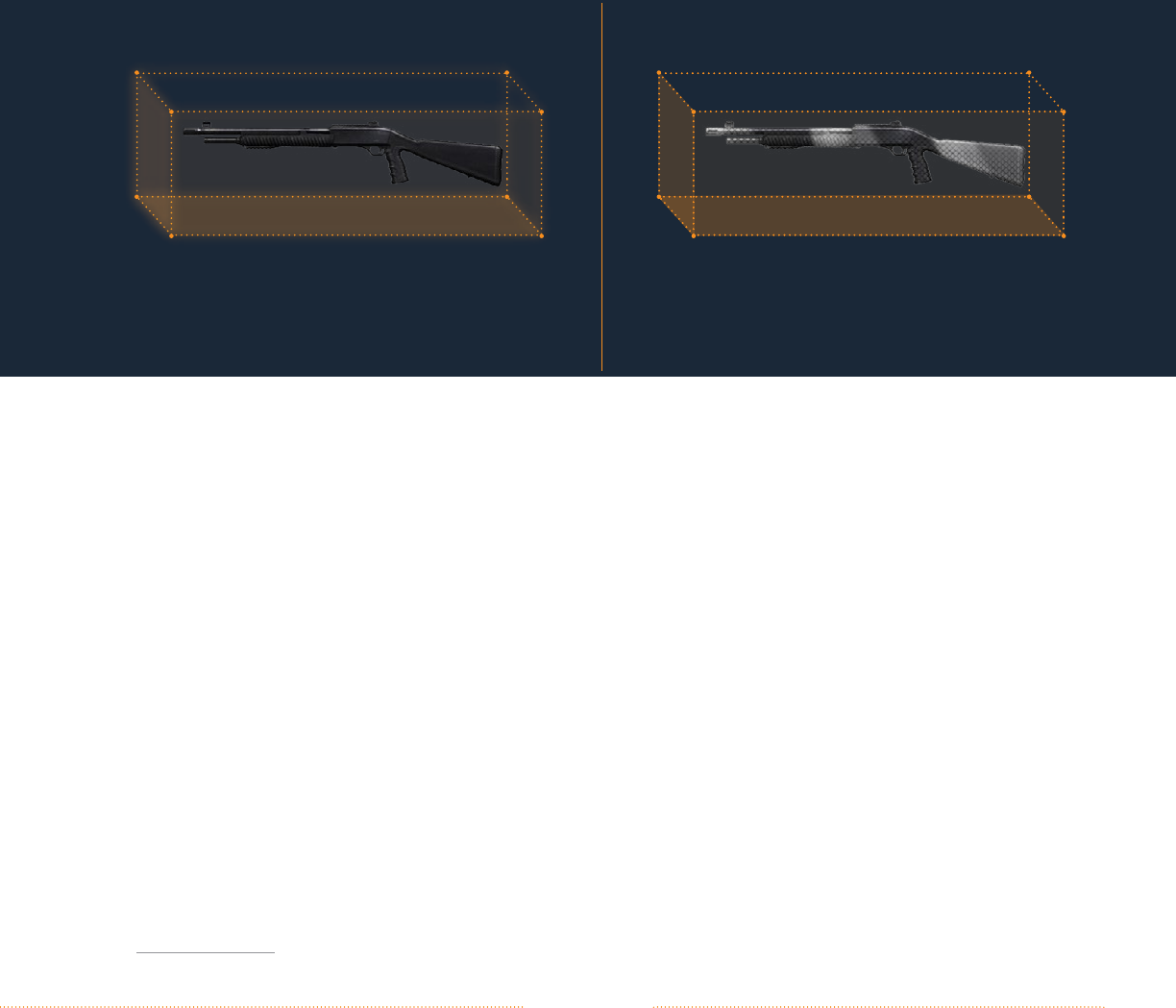
39Appendix C
Appendix C: Virtual Goods Trading
Virtual goods are digital assets purchased for use in online communities or games.
OPSkins specializes in the enhancement of standard goods found in online games.
Though not all video games enable virtual goods trading between players, the most
forward thinking video game publishers have beneted greatly by allowing their in-game
trading economy to thrive. The largest single market of tradable assets are called “skins”
(also referred to as nishes) for Counter-Strike: Global Offensive (CS:GO). Skins are strictly
cosmetic and do not affect game play.
Virtual Goods Example: Item Skins
Currently the estimated market value for CS:GO skins trading is over $10 billion annually.
Skins adorn objects and players in the games with colorful designs. You can see skins on
weapons, masks, sunglasses, shoes, and many other goods.
In other major tradable games like the H1Z1 family (Just Survive and H1Z1: King of the
Kill), the options go further to include other special movements that do not affect game
play (dancing or hand movements).
The most famous game series that started the trading ecosystem was World of Warcraft
(WOW). In WOW, virtual gold pieces were acquired by “gold farming”
3
and created
marketplaces for buying and selling.
Virtual shotgun without skin Virtual shotgun with skin
3 https://en.wikipedia.org/wiki/Gold_farming
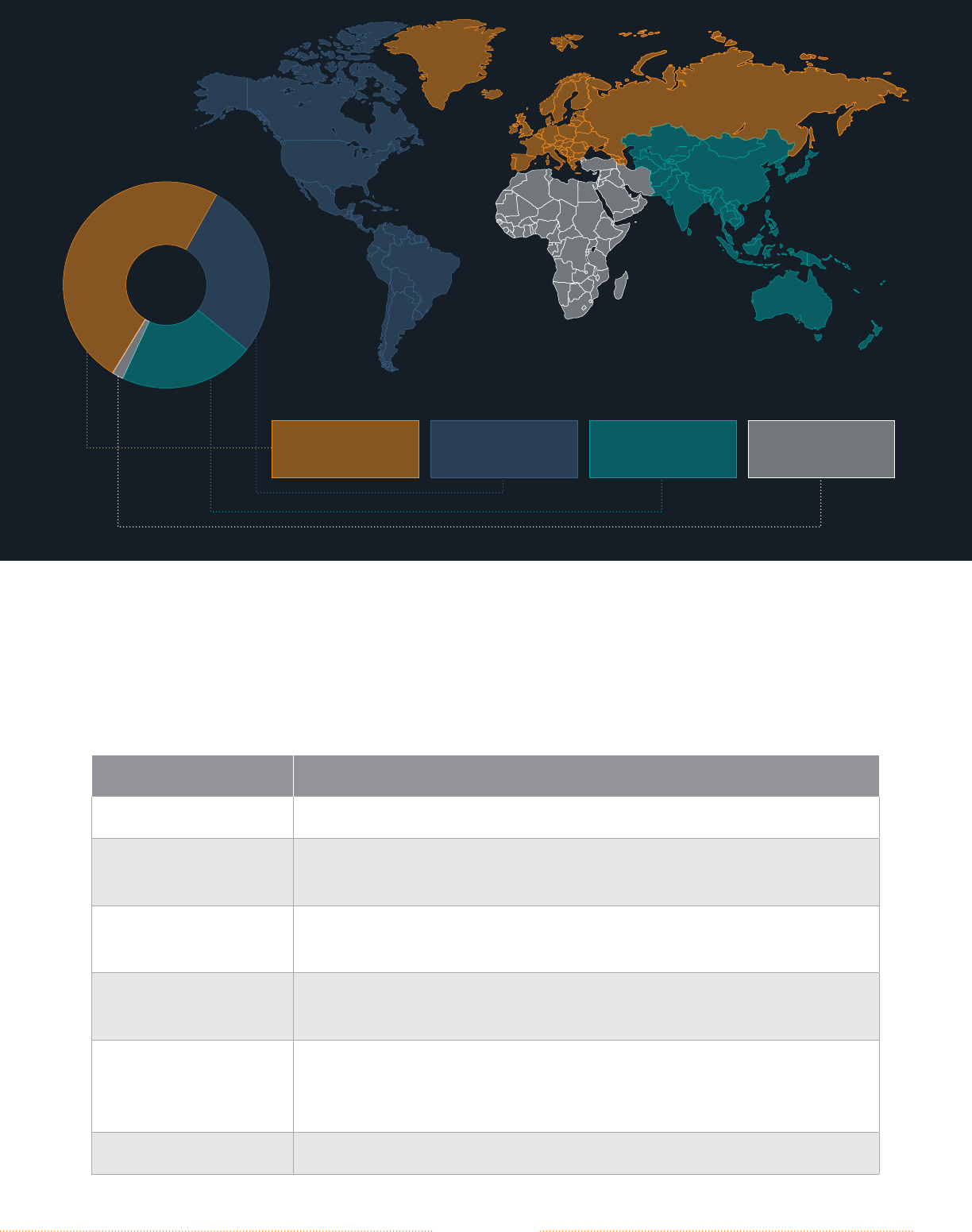
40Appendix C
With ever-increasing value per transaction, billions of virtual goods trades occur between
players. Some goods are only worth pennies, while others trade for thousands of US
dollars. However, in almost all goods trading, there is enormous friction during buying,
selling, and trading of virtual goods. The friction is due to the following key factors:
Key Factor Issue
Trust General distrust in the trading environment between unknown players
Fraud
High prevalence of stolen accounts (typically via hacking) and stolen
payment methods such as credit cards
Cost
Fiat-based (USD, Euros, Yuan, etc.) transactions are costly and
impractical for small amounts
Forex
Foreign exchange in cross-border transactions is typically complicated
or impossible
User Interface (UX)
Centralized control of the assets by game publishers or trading
platforms can slow down and complicate trading without proper high-
volume API’s in place
Liquidity Without sucient buyers and sellers, marketplaces simply don’t work
BTC, AlipayBTC, Alipay, Weixin Pay
BTC, PayPal, G2A,
Visa/Mc, Boa Compra
BTC, Skrill, Netteller,
Paysafe, Yandex,
WebMoney
3%19%29%49%
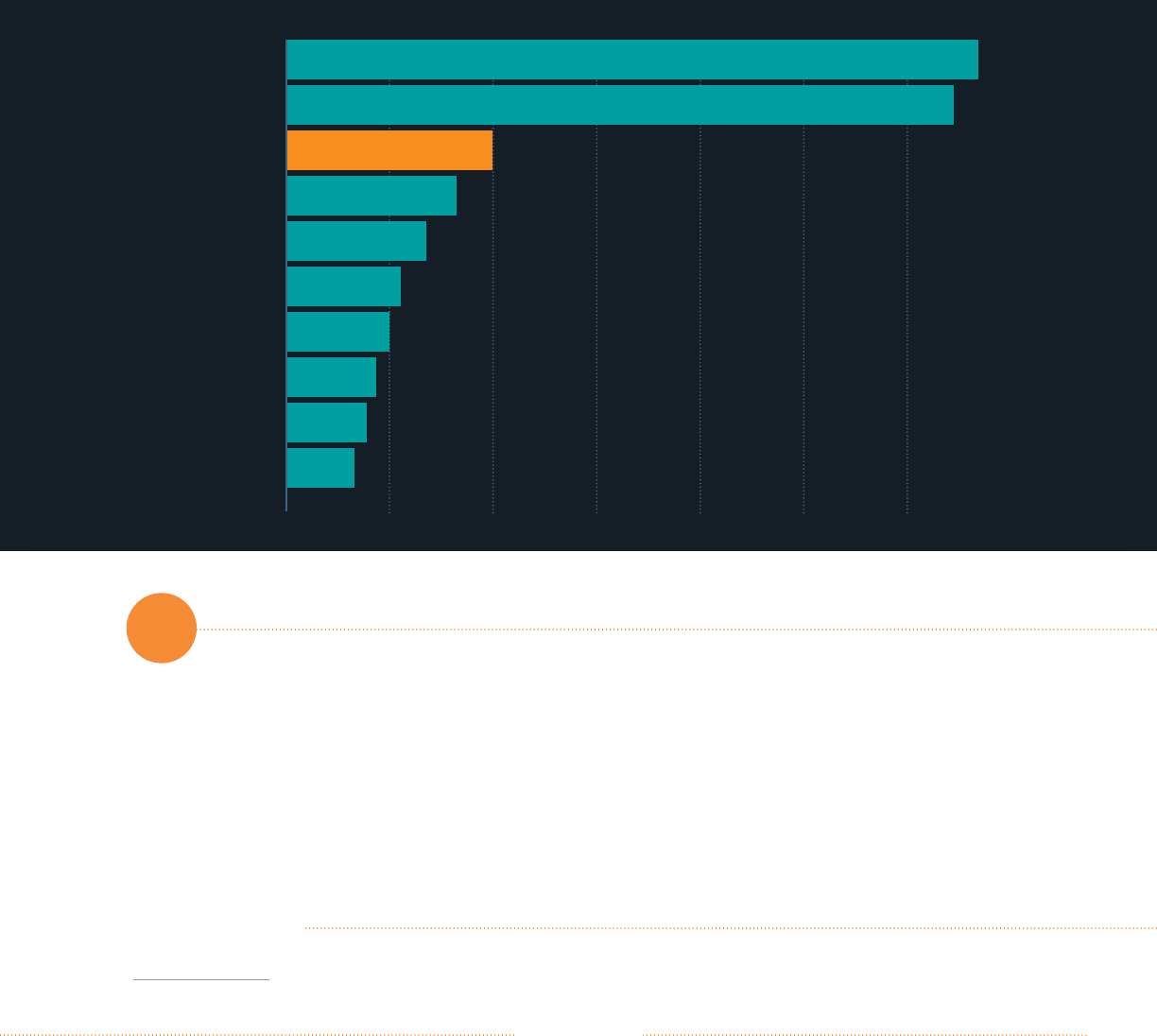
41Appendix C
The trust required for global acceptance of at currencies such as US dollars, Euros or
Chinese Yuan began with the presumption of reliability, centralized authority, and liquidity.
In the past few years, 400+ million players worldwide now regard digital virtual assets with
the same level of trust as the rest of the global population does in at currency. Millions
of players use the virtual goods as stored value. Some of the most popular games with
tradable assets include Dota 2 (103 million downloads), Team Fortress 2 (39 million
downloads) and Counter-Strike: Global Offensive (30 million downloads)
4
. Each garners a
sizable audience and together, these audiences would constitute the third largest country
in the world.
Within the world of game play and virtual goods during the
last few decades, 400+ million players worldwide now regard
digital virtual assets with the same level of trust as the rest of
the global population places in at currency. This audience in
aggregate would constitute one of the largest countries in
the world.
“
400 600 800 1,000 1,2000 200
China
India
Online Gamers
USA
Indonesia
Brazil
Pakistan
Nigeria
Bangladesh
Russia
1,384 million
1,318 million
400 million
325 million
261 million
207 million
197 million
188 million
162 million
146 million
4 https://www.statista.com/topics/2290/mmo-gaming/

42Appendix C
Through its virtual asset trading platform, www.opskins.com, OPSkins has created
trust and eliminated nearly 100% of fraud losses borne by the buyer by creating digital
settlement execution services. The fraud risk has shifted to OPSkins instead of individual
sellers/buyers. Because OPSkins collects at currency such as US dollars, Euros and
Chinese Yuan, it must maintain extensive banking relationships and fraud mitigation
departments as well as disallow many trades from new account holders using PayPal
or credit cards in order to avoid excessive losses. Because OPSkins and other trade
platforms are inherently centralized, gamers interested in buying, selling, or trading assets
cannot transact off-platform in a peer-to-peer fashion with the same safety and eciency.
The method for trade can differ dramatically between games without an automated API.
Liquidity is another major obstacle for gamers to operate their own trade sites. If there
is not critical mass of buyers and sellers, prices will be elevated and selection limited. In
addition, sales may lag due to a lack of demand.
The majority of virtual goods trading occurs for games published by Valve Software, maker
of the Steam
5
game distribution platform. Steam serves a community of 65 million gamers
worldwide. The top six publicly traded game companies have sizable audiences with 2017
revenue of $41 billion. In addition, Sony, Tencent, Microsoft, Nintendo, Activision Blizzard,
and EA use virtual assets
6
.
The market for these tradable assets is estimated at nearly $50 billion, half of which is
through platforms such as OPSkins and through informal interaction between gamers who
share social networks. Many of the 400 million world wide multi-player online video game
players seek to trade their skins for at and cryptocurrency such as Bitcoin and Ethereum.
Though cryptocurrency has a relatively small adoption pool for virtual goods trading
today, bitcoin and similar currencies are ideal to address cross border currency issues and
microtransactions
7
.
Because online video gaming is a global phenomenon, most trades occur between
players located in different countries. Accordingly, virtual asset trading users endure
high transaction costs (i.e. international payment processing fees and value lost through
currency conversion). Simply eliminating these cross border transaction costs between
the millions of virtual assets traded every day would be sucient economic justication
for WAX to exist. WAX will immediately benet the global community of virtual asset
traders by lowering costs to get the best prices for buyers and sellers. WAX would also
enable microtransactions that would otherwise be infeasible cross border.
WAX will provide the ability to buy, sell, or trade skins and other virtual assets in a peer-
5 http://www.valvesoftware.com/
6 https://en.wikipedia.org/wiki/Video_game_publisher
7 https://en.wikipedia.org/wiki/Microtransaction

43Appendix C
to-peer method that does not require a centralized party. WAX creators believe this
will expand the market considerably, allowing hundreds or thousands of online sites to
facilitate trades while also accessing a highly liquid marketplace, ensuring that prices
are fair and transactions occur quickly and at a low cost, especially across international
borders.

44
Disclaimer
This WAX white paper is for information purposes only. WAX does not
guarantee the accuracy of or the conclusions reached in this white paper,
and this white paper is provided “as is.” WAX does not make and expressly
disclaims all representations and warranties, express, implied, statutory
or otherwise, whatsoever, including, but not limited to: (i) warranties of
merchantability, tness for a particular purpose, suitability, usage, title or
non-infringement; (ii) that the contents of this white paper are free from
error; and (iii) that such contents will not infringe third-party rights. WAX
and its aliates shall have no liability for damages of any kind arising
out of the use, reference to, or reliance on this white paper or any of
the content contained herein, even if advised of the possibility of such
damages. In no event will WAX or its aliates be liable to any person or
entity for any damages, losses, liabilities, costs or expenses of any kind,
whether direct or indirect, consequential, compensatory, incidental, actual,
exemplary, punitive or special for the use of, reference to, or reliance on
this white paper or any of the content contained herein, including, without
limitation, any loss of business, revenues, prots, data, use, goodwill or
other intangible losses.
All references in this WAX white paper to the WAX platform, regardless of
tense, are intended to be references to how the WAX platform will operate
when it is fully operational. See the WAX roadmap on page 21 of this WAX
white paper for information about the expected development of the WAX
platform.
